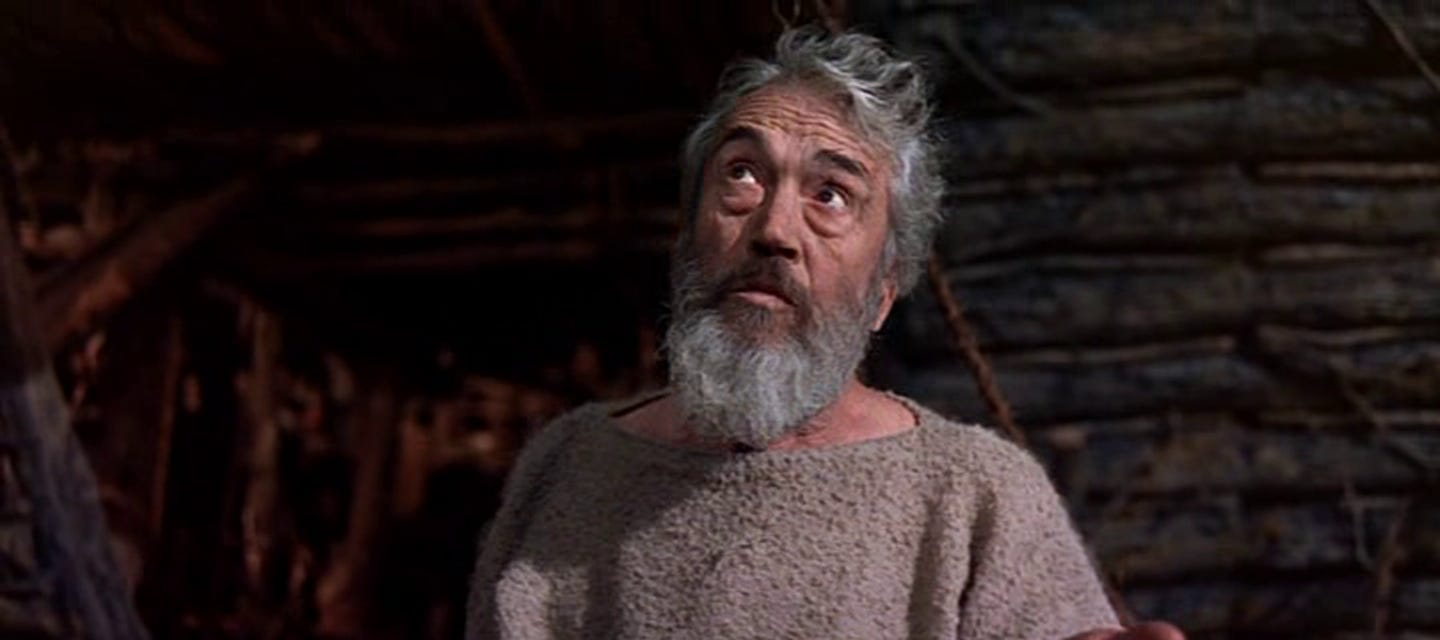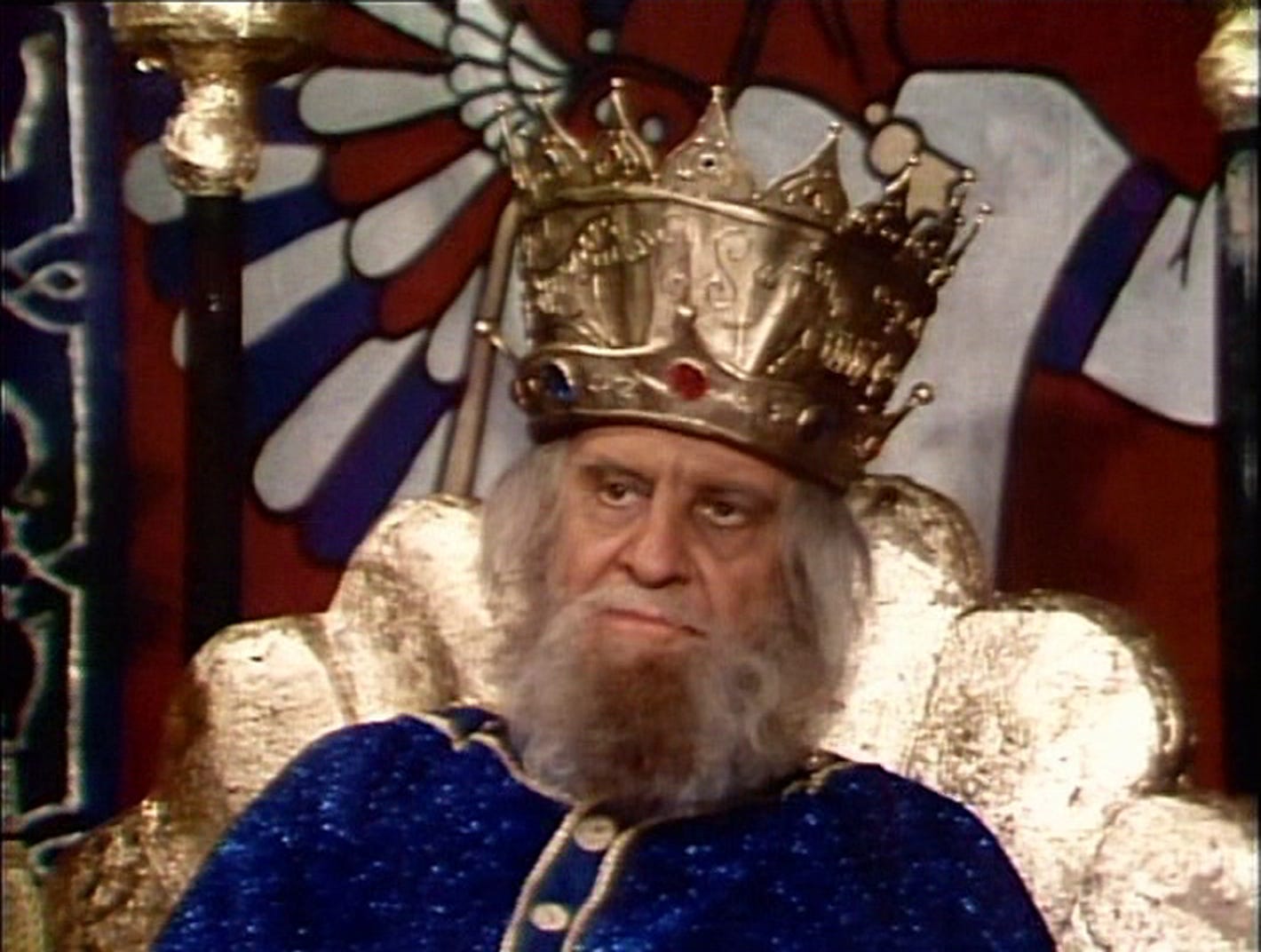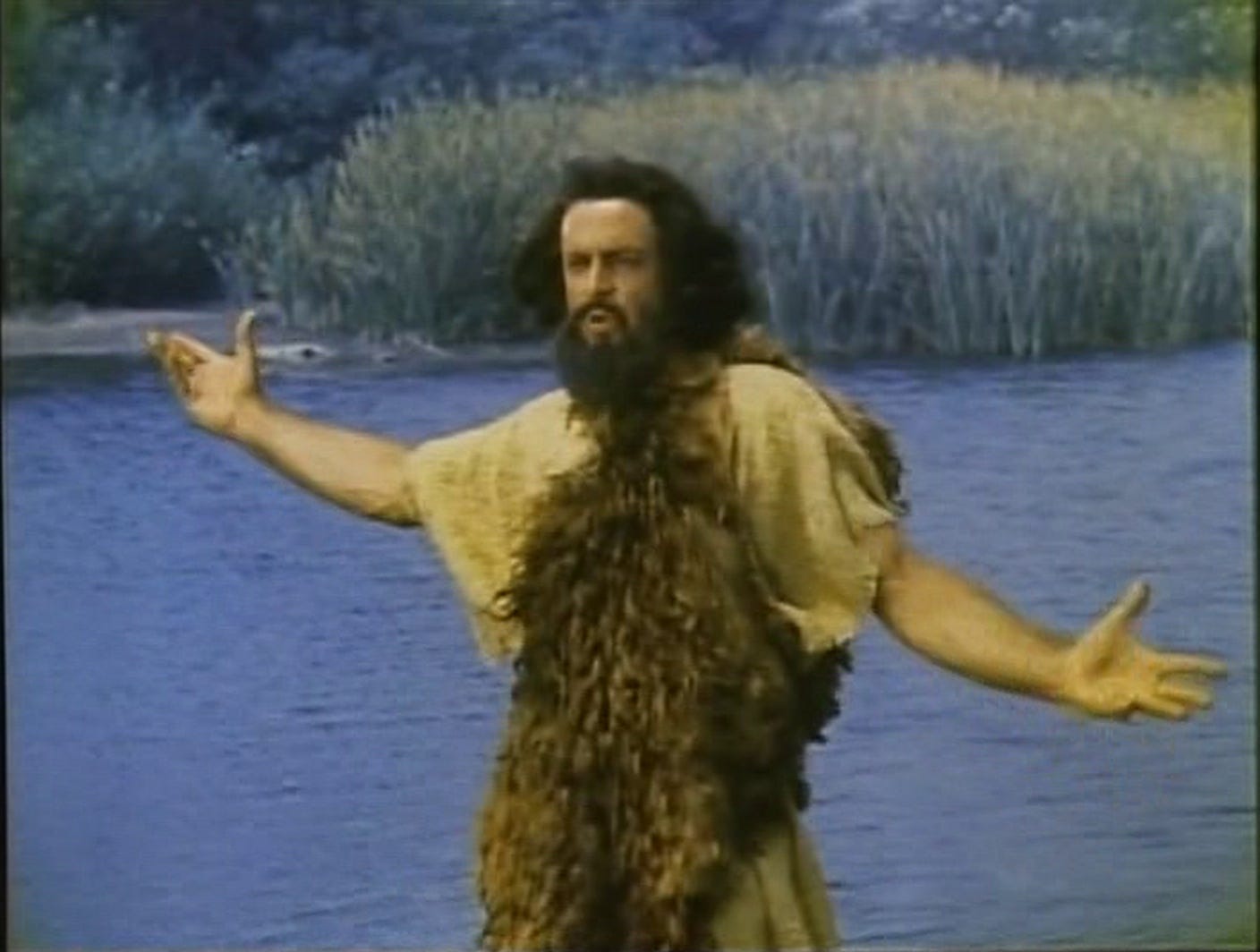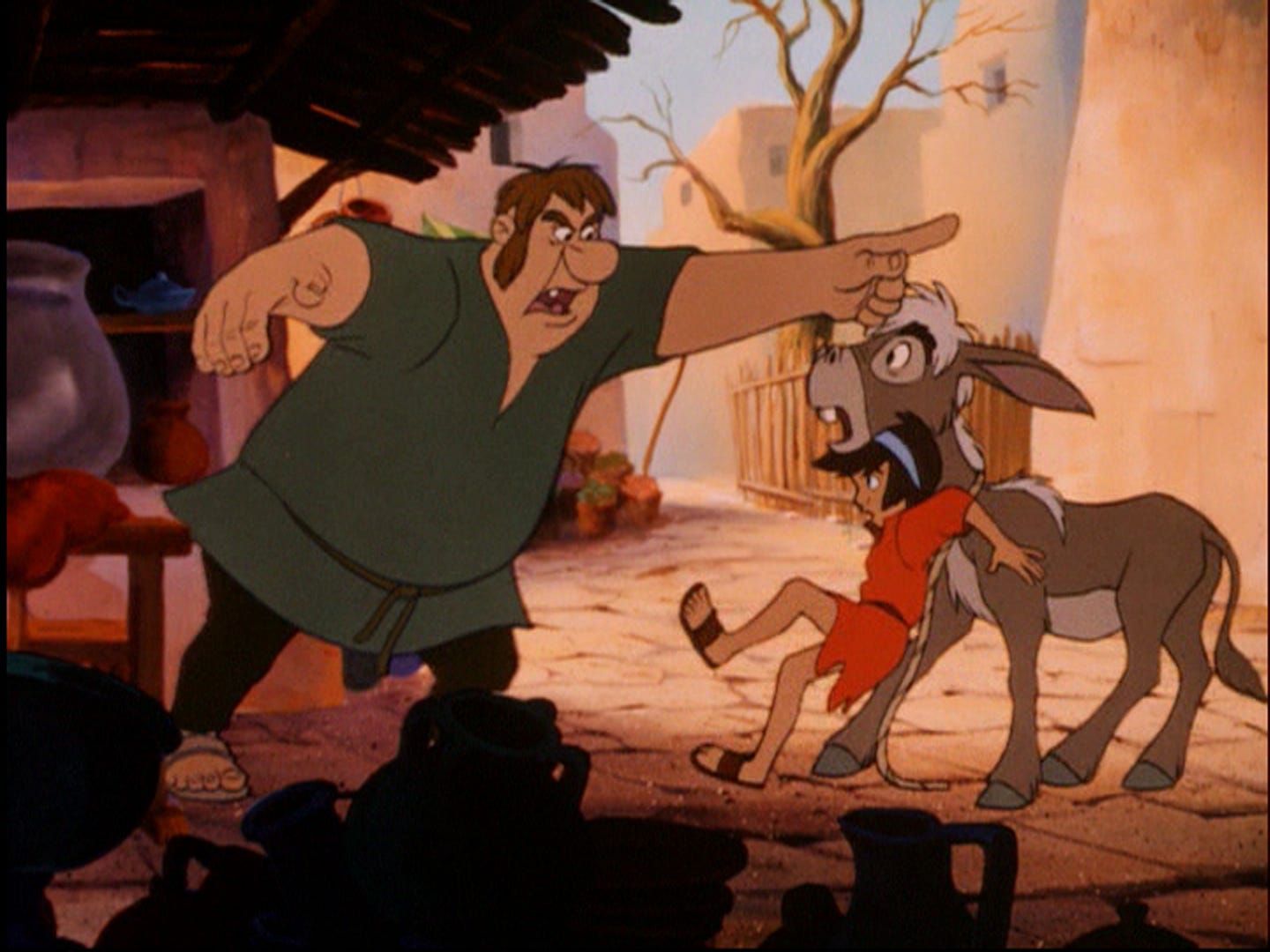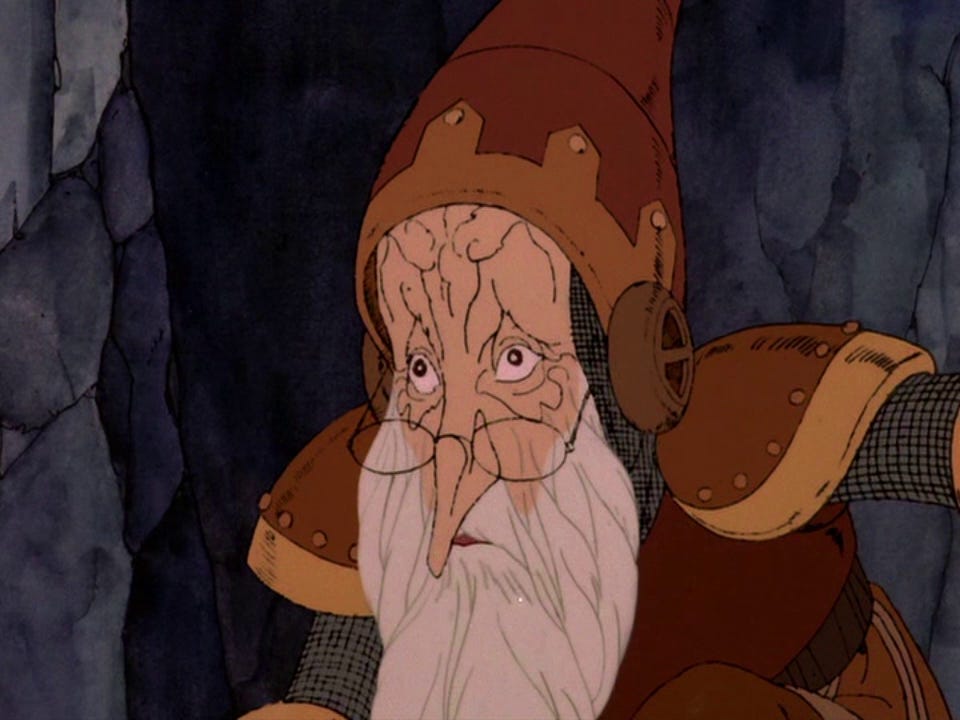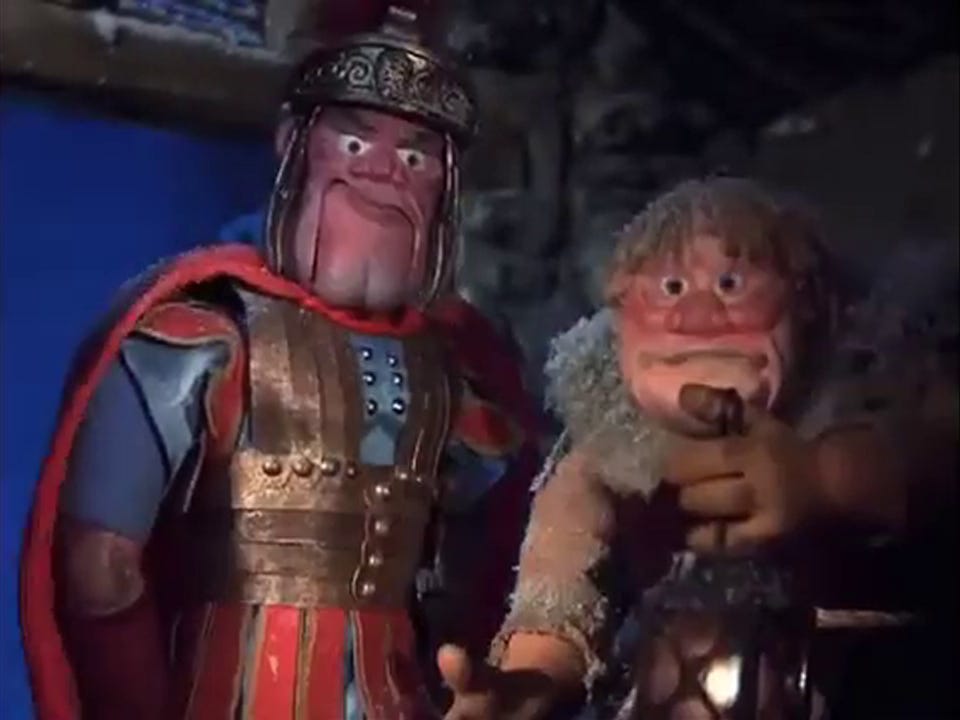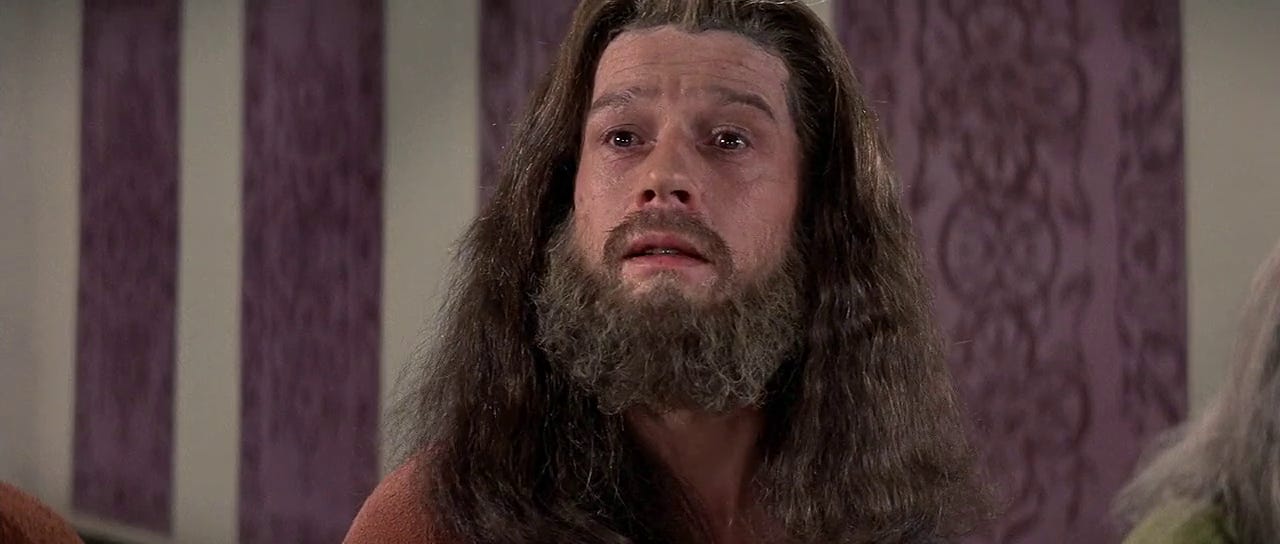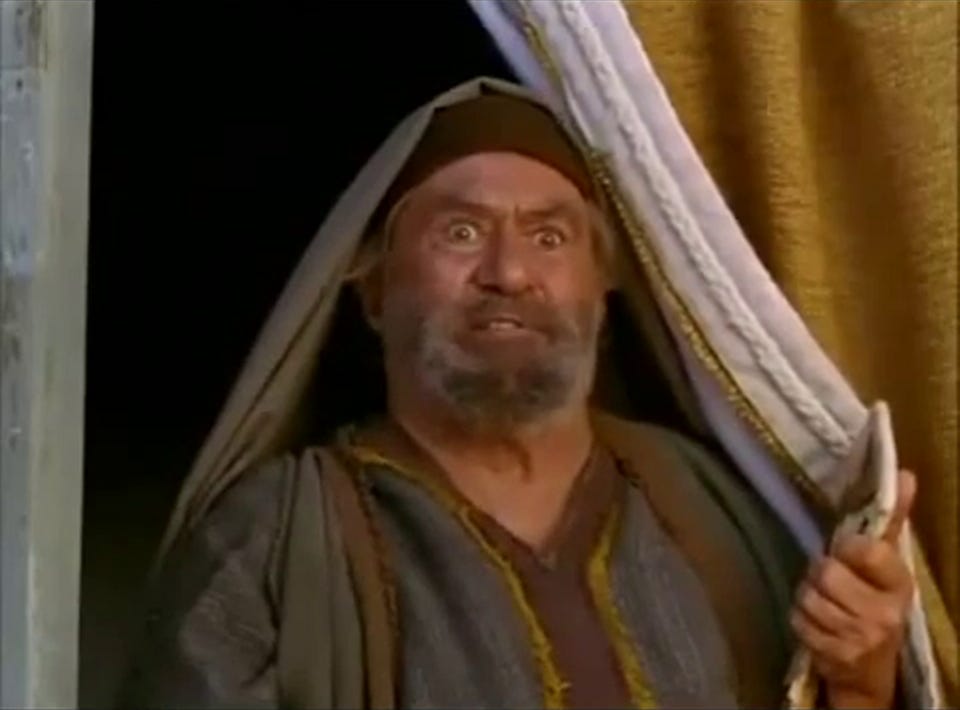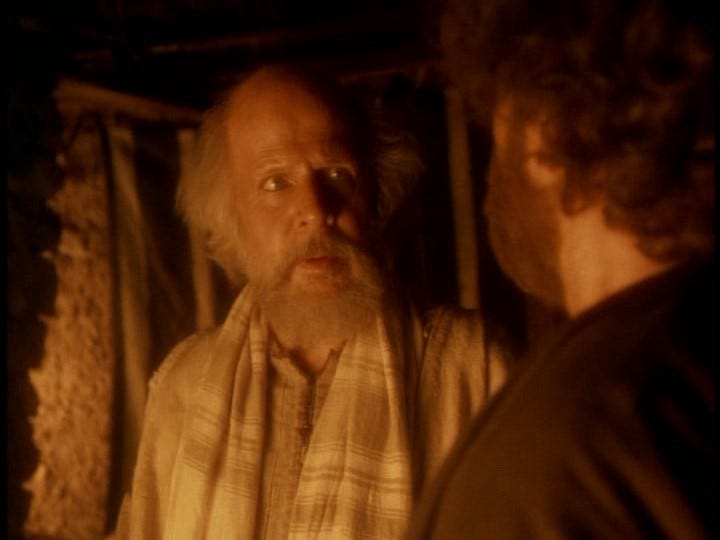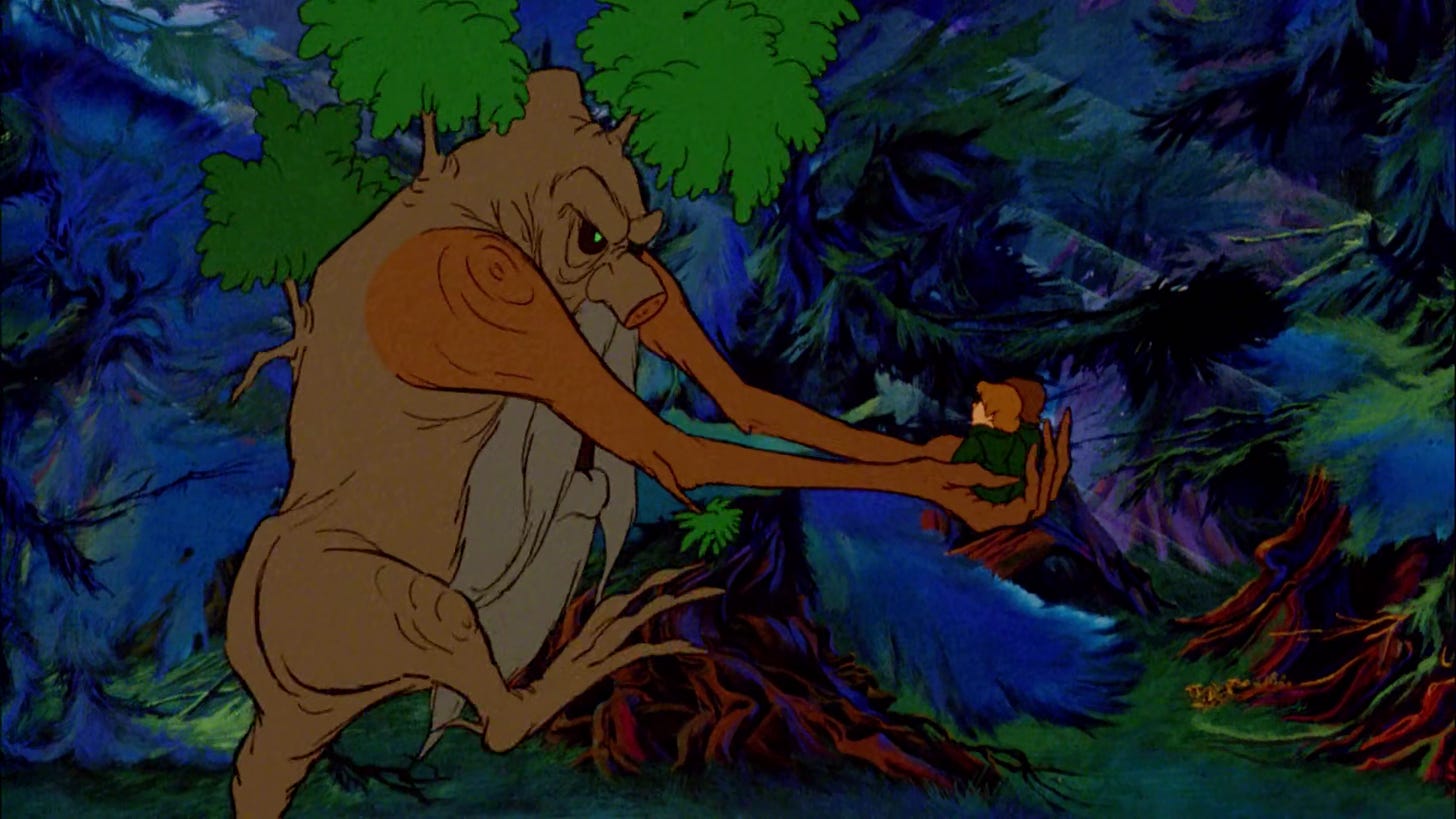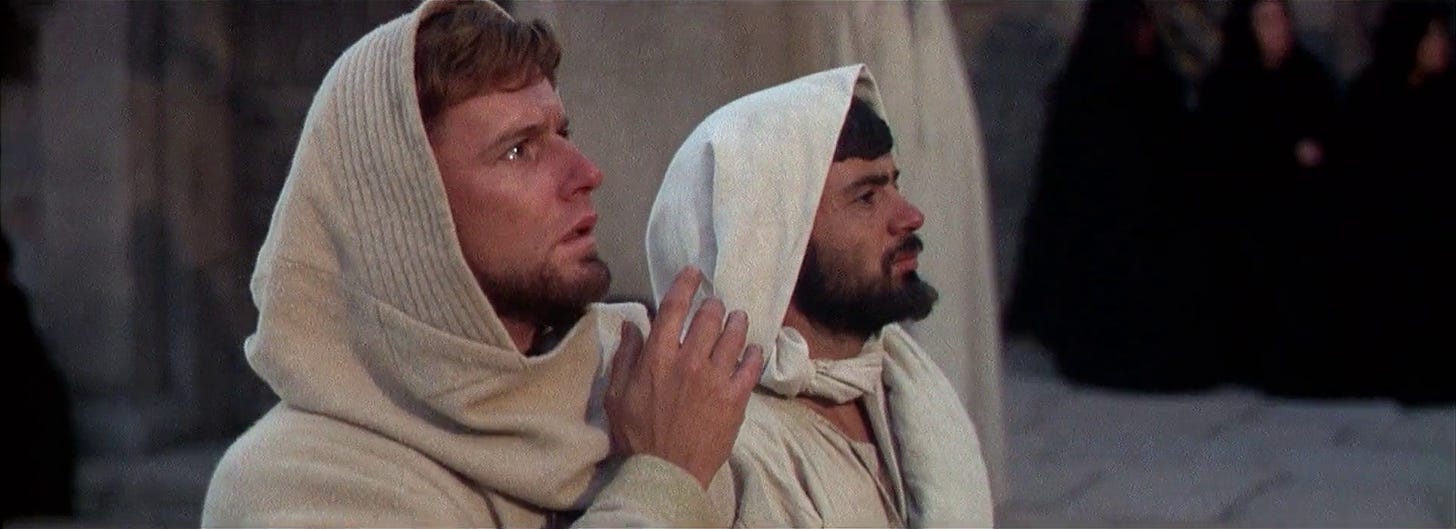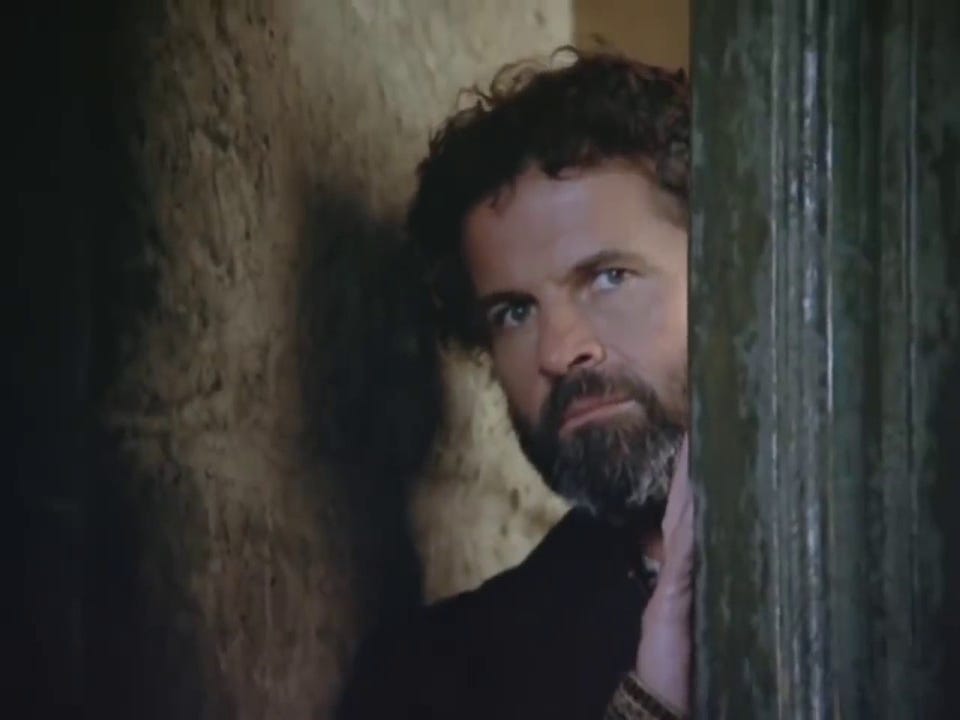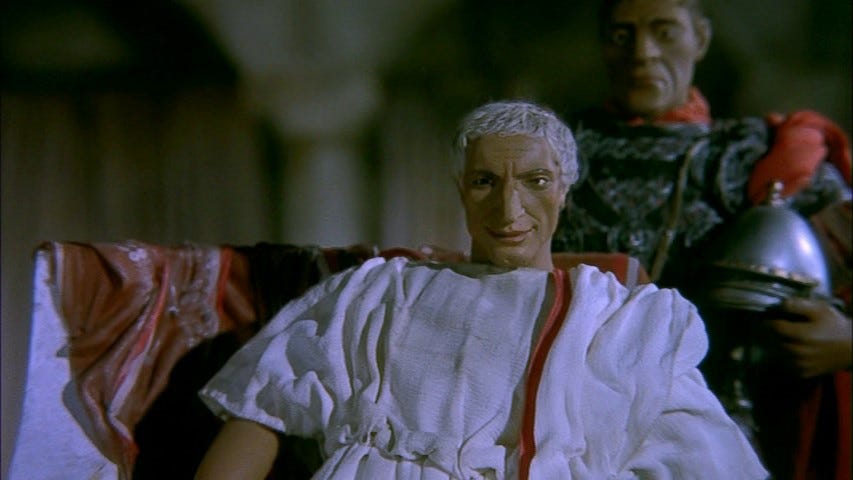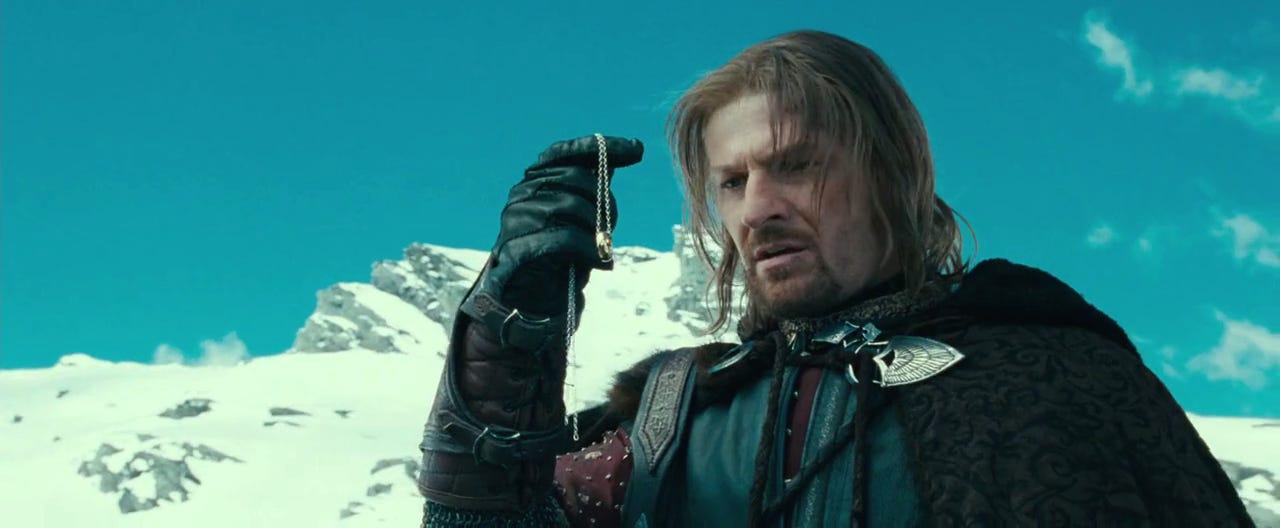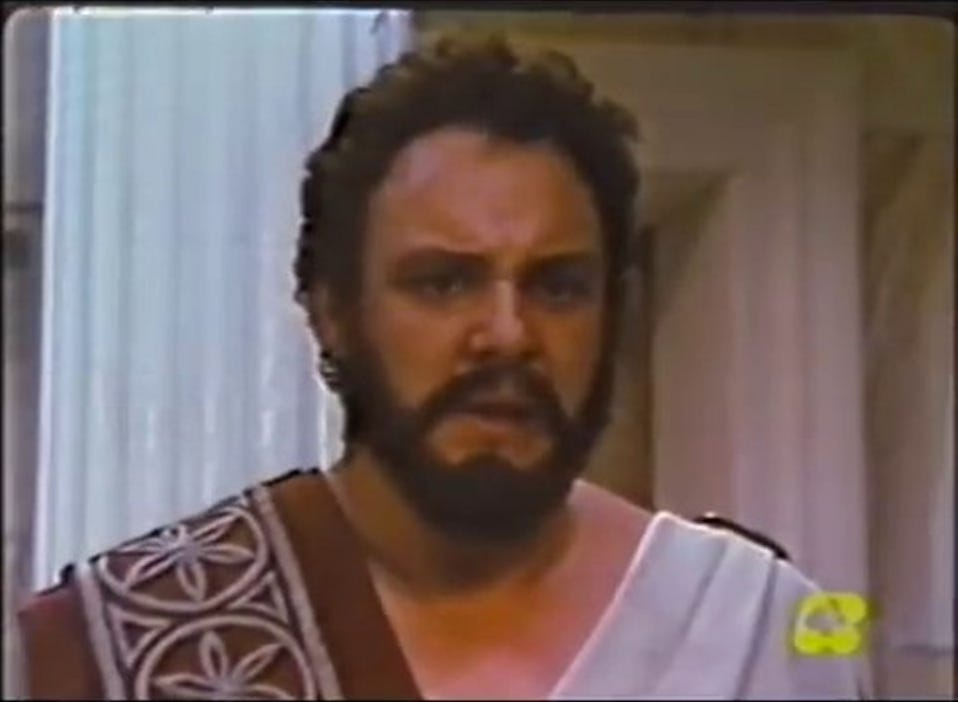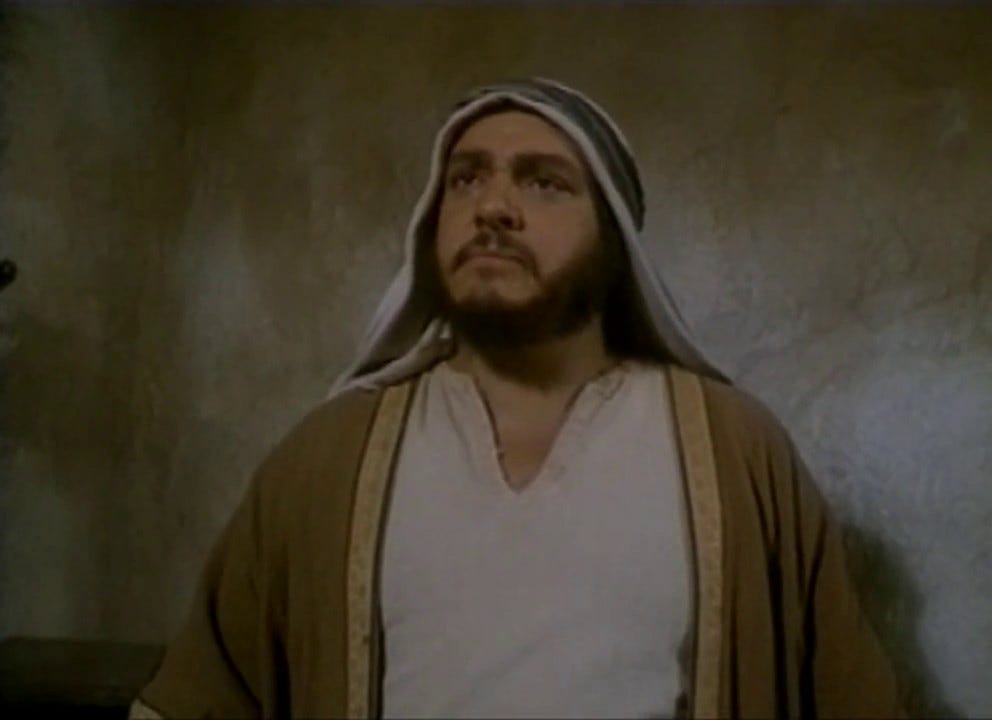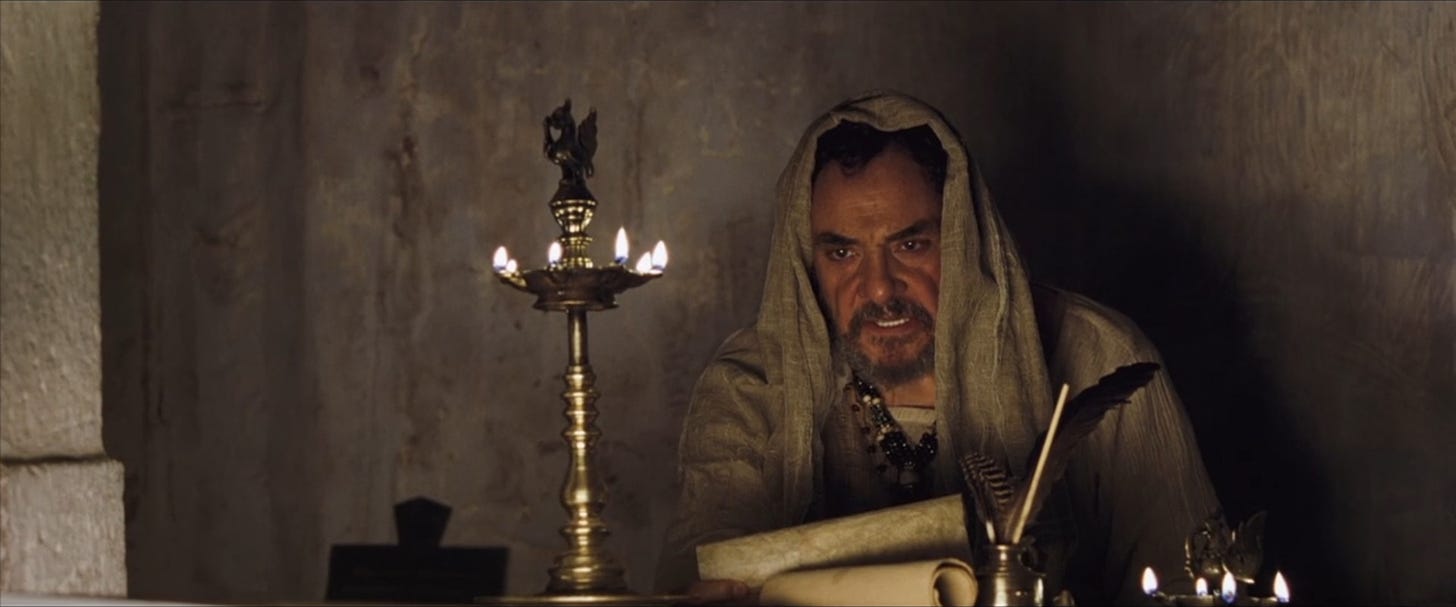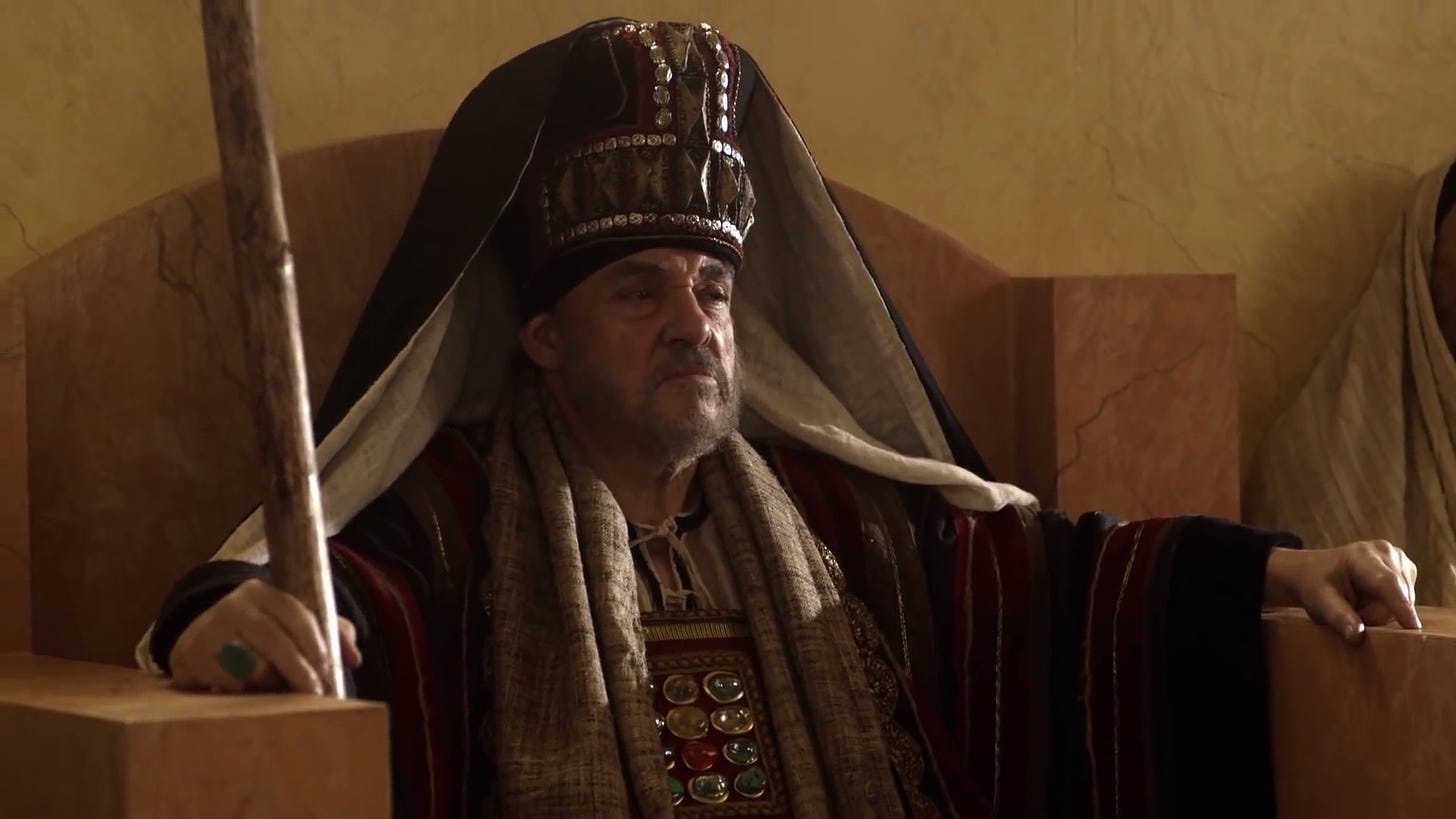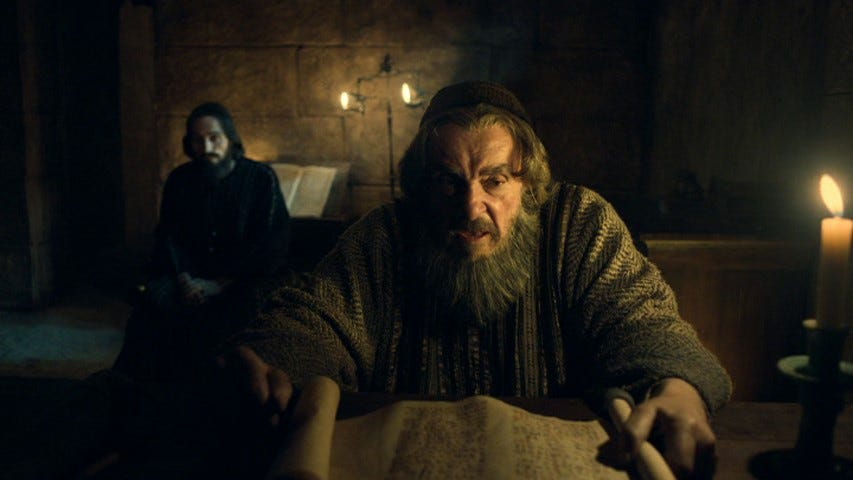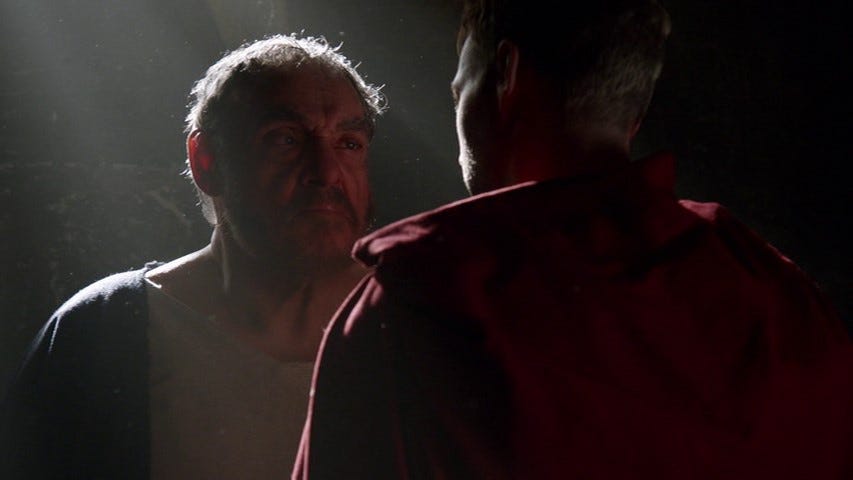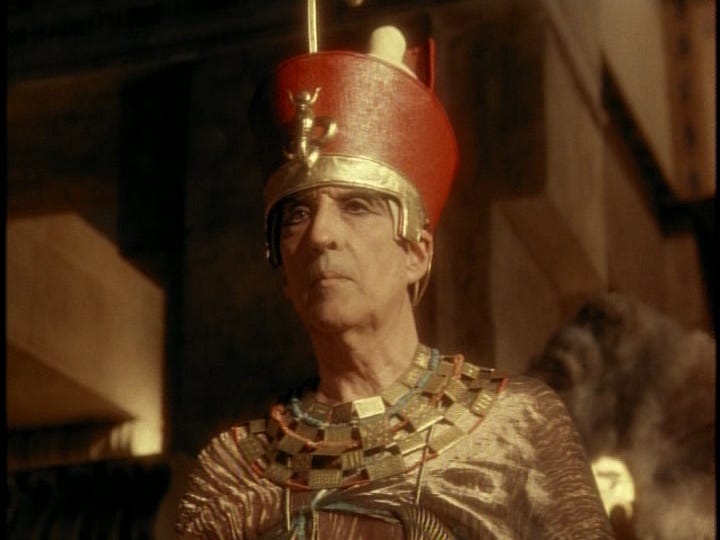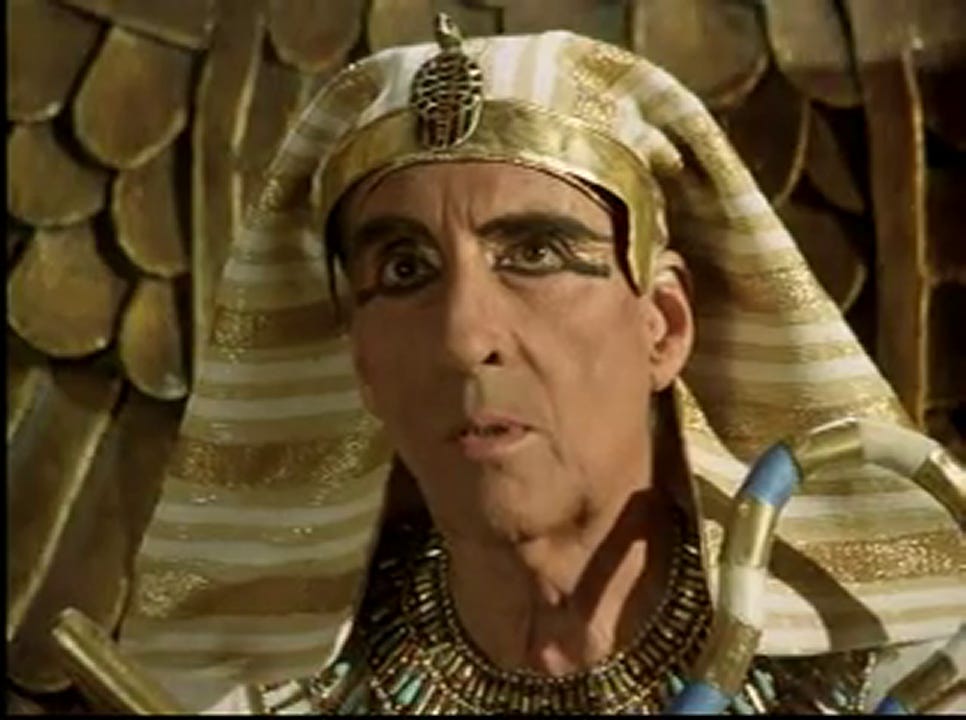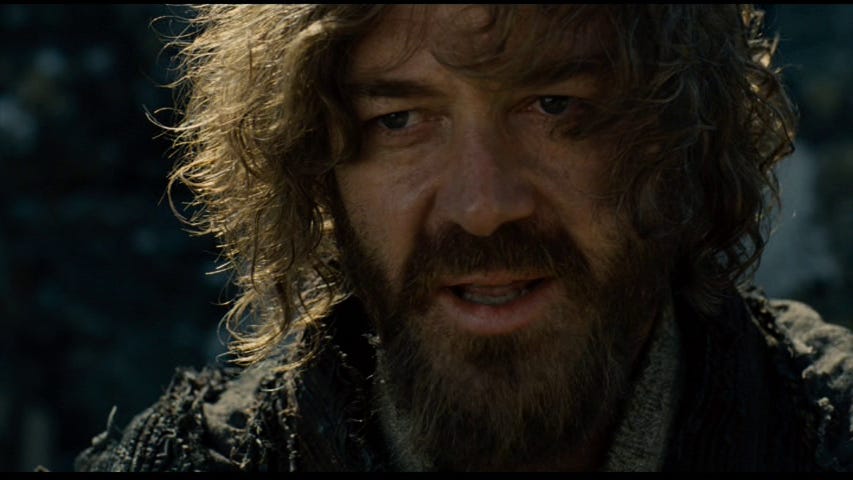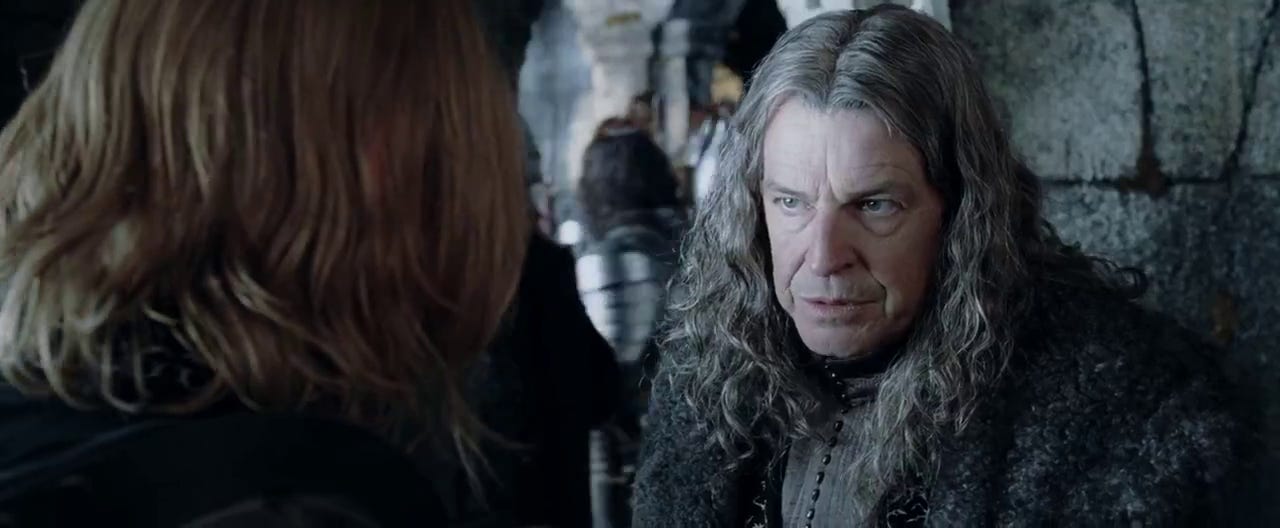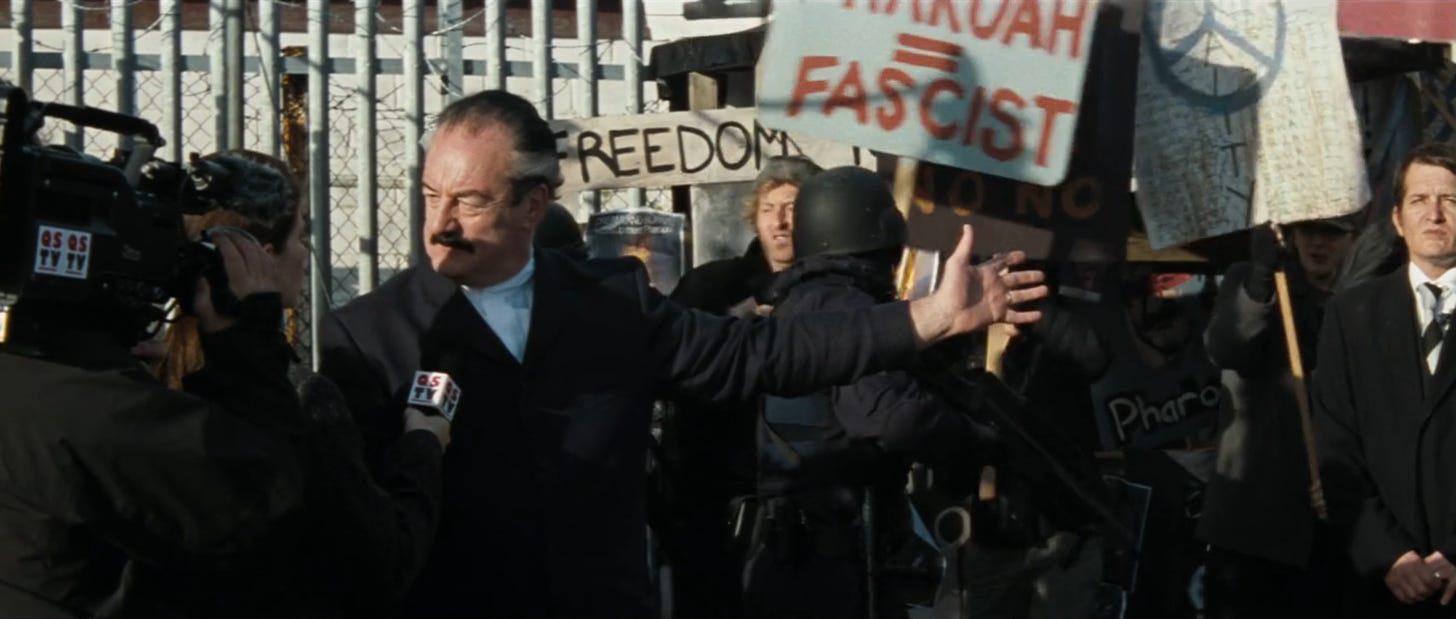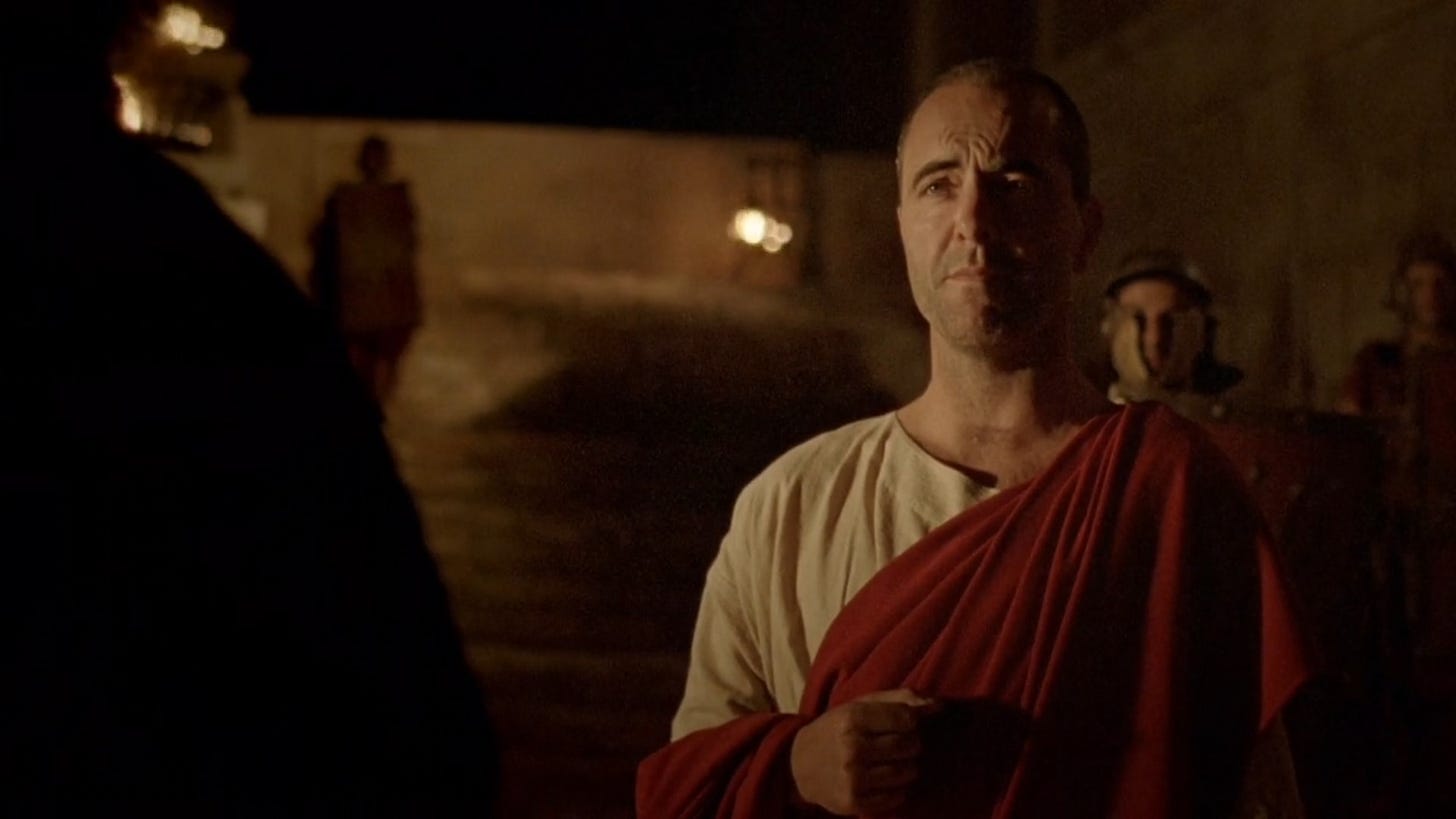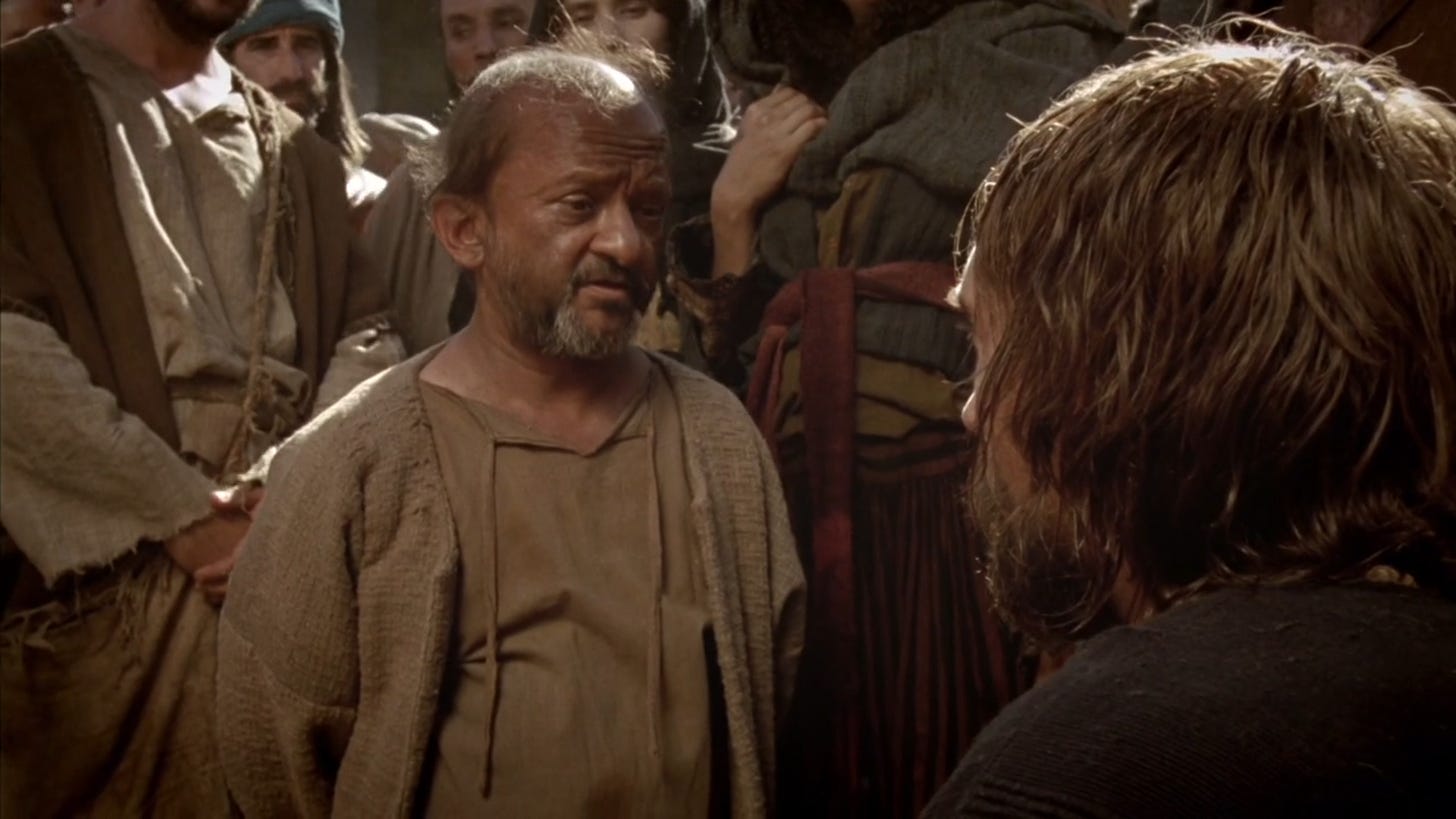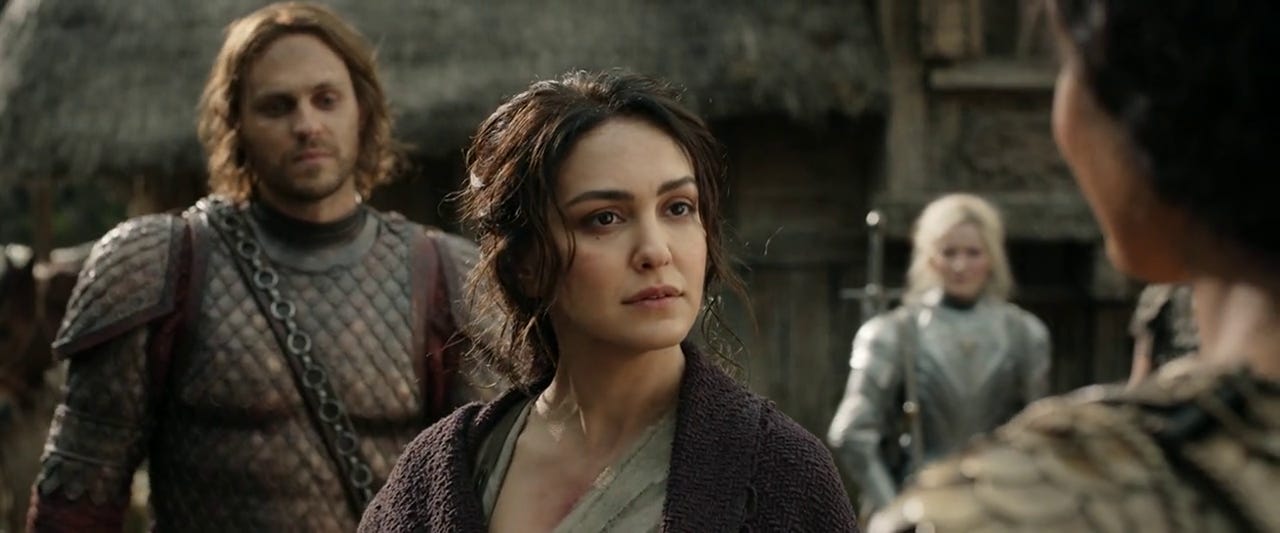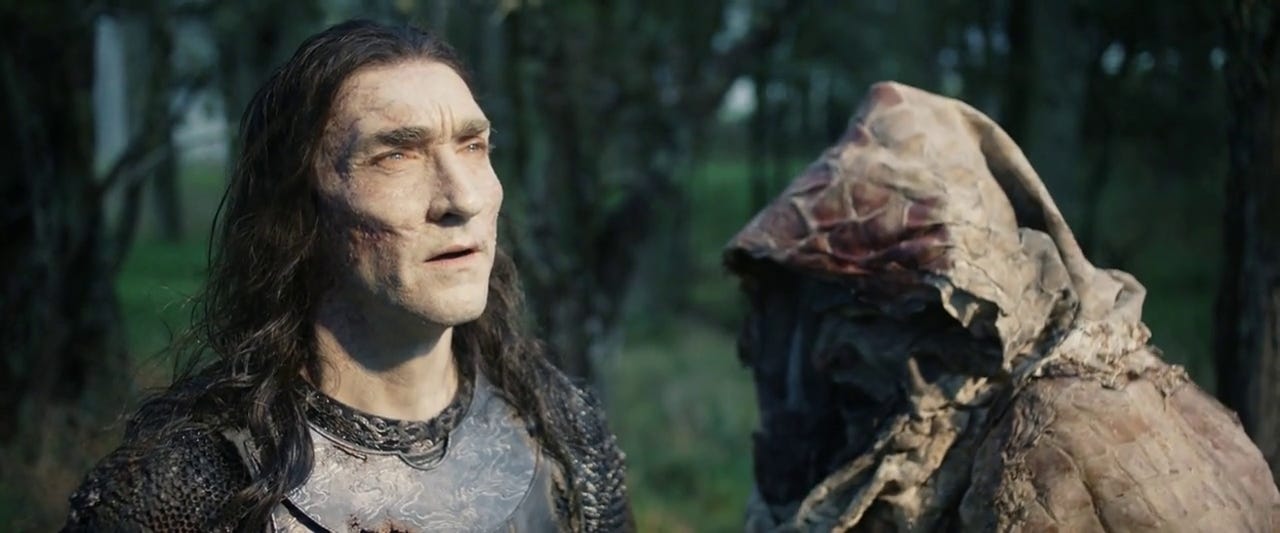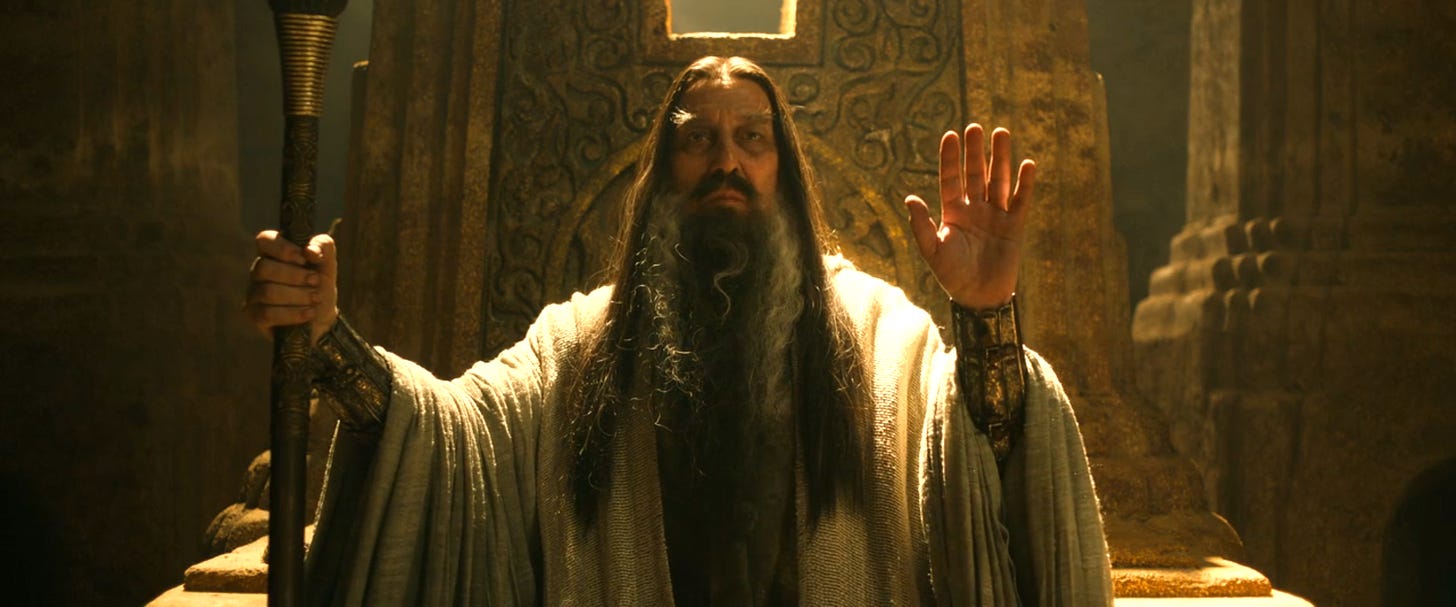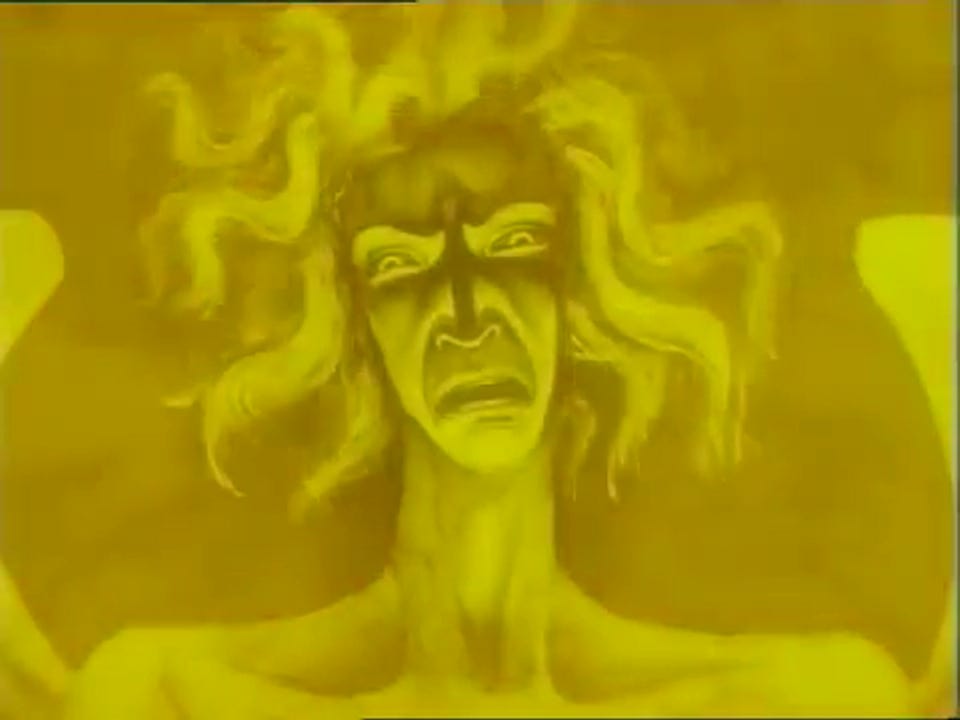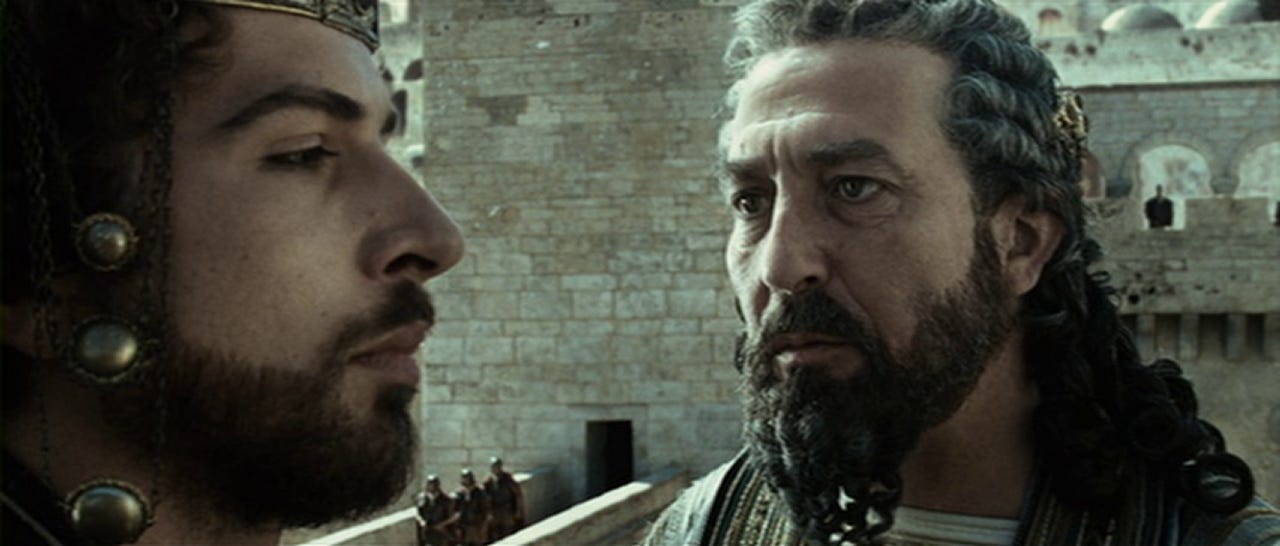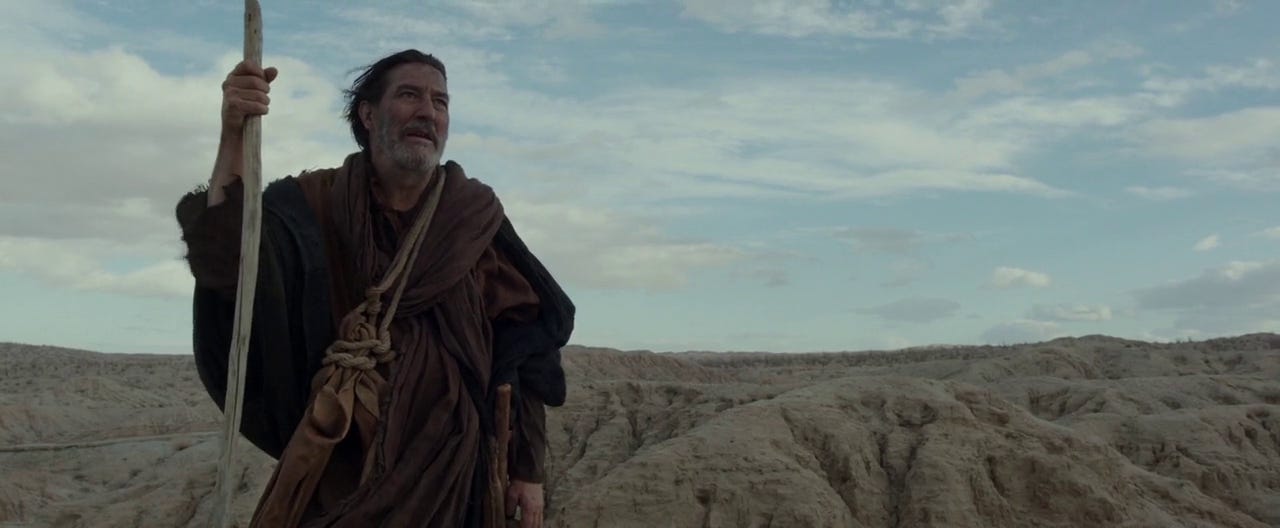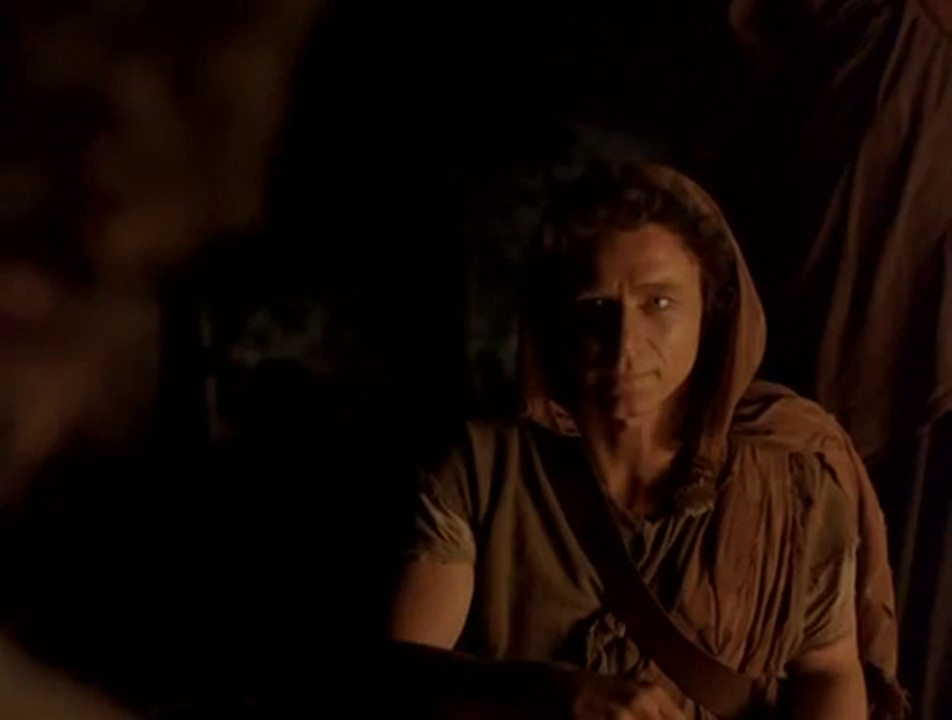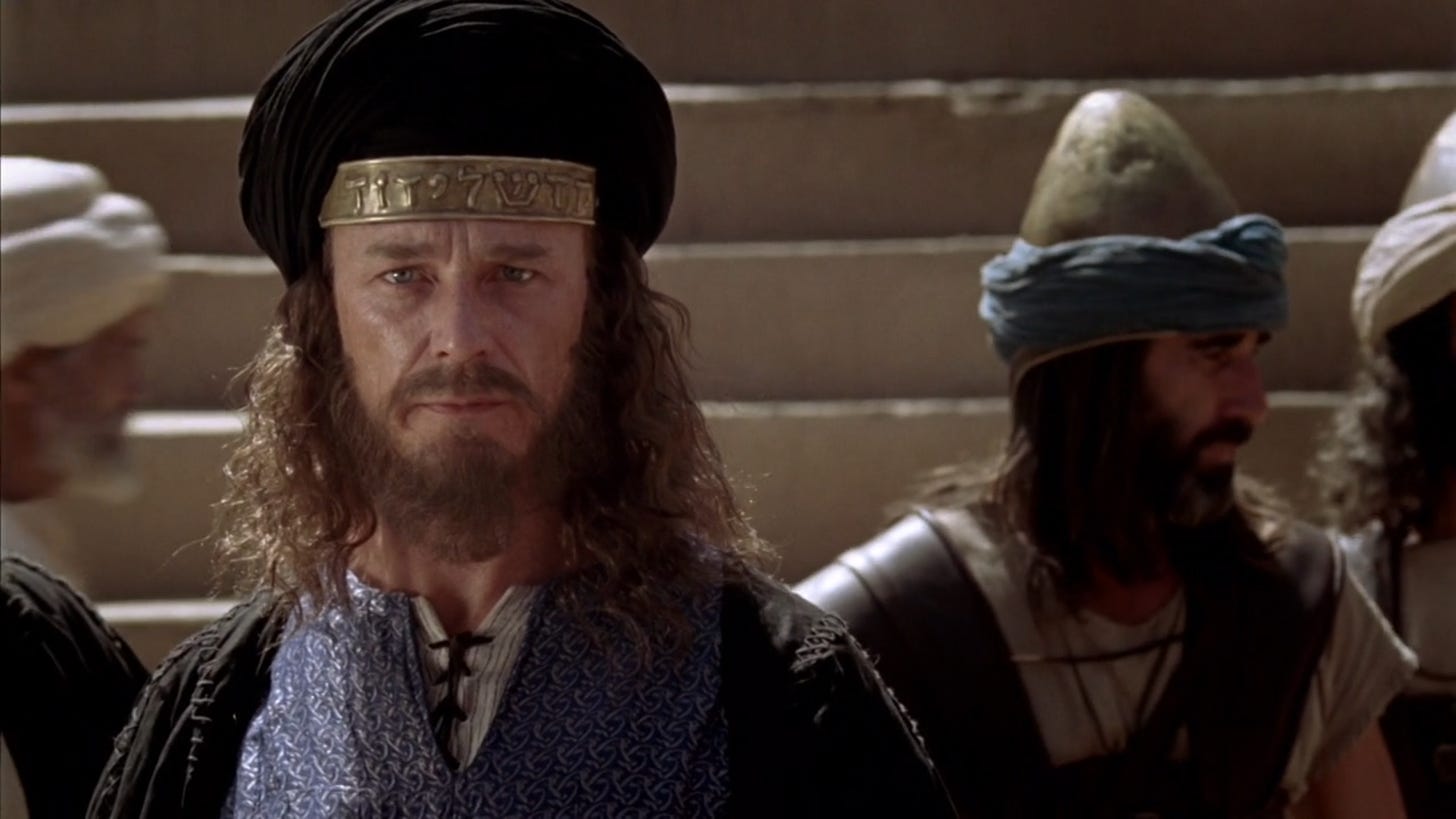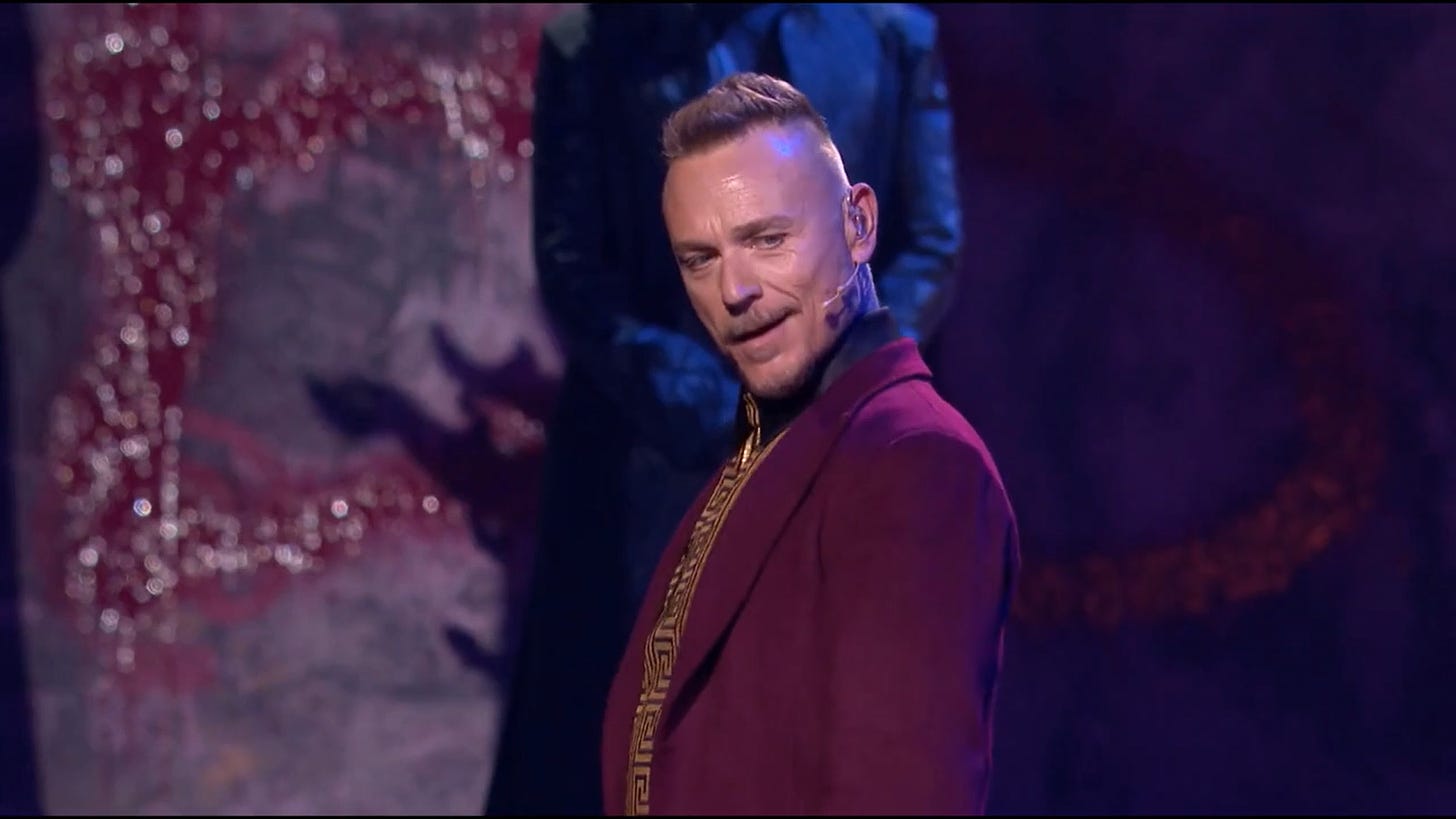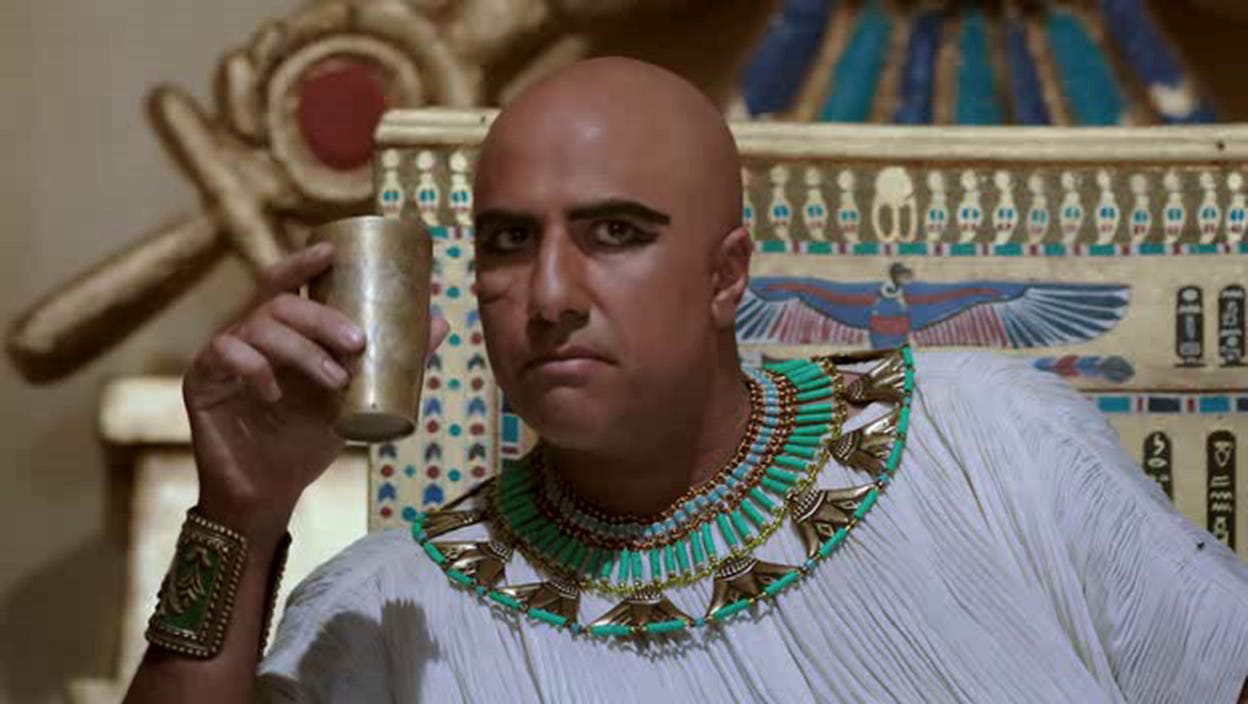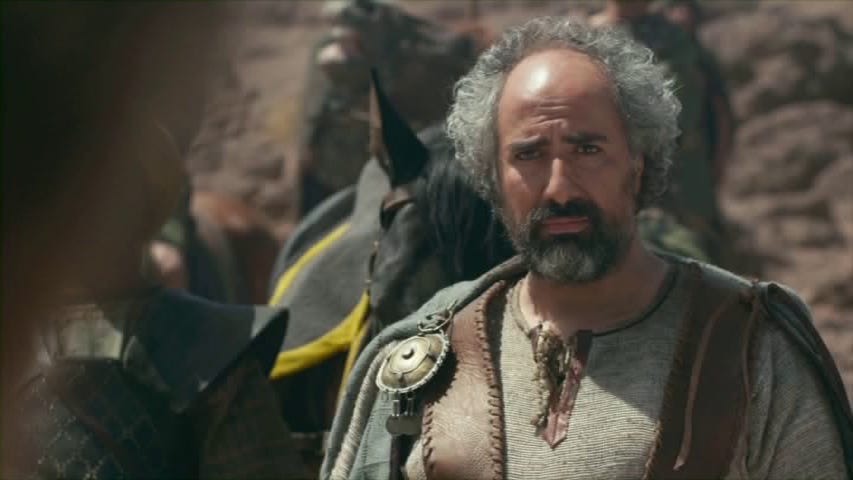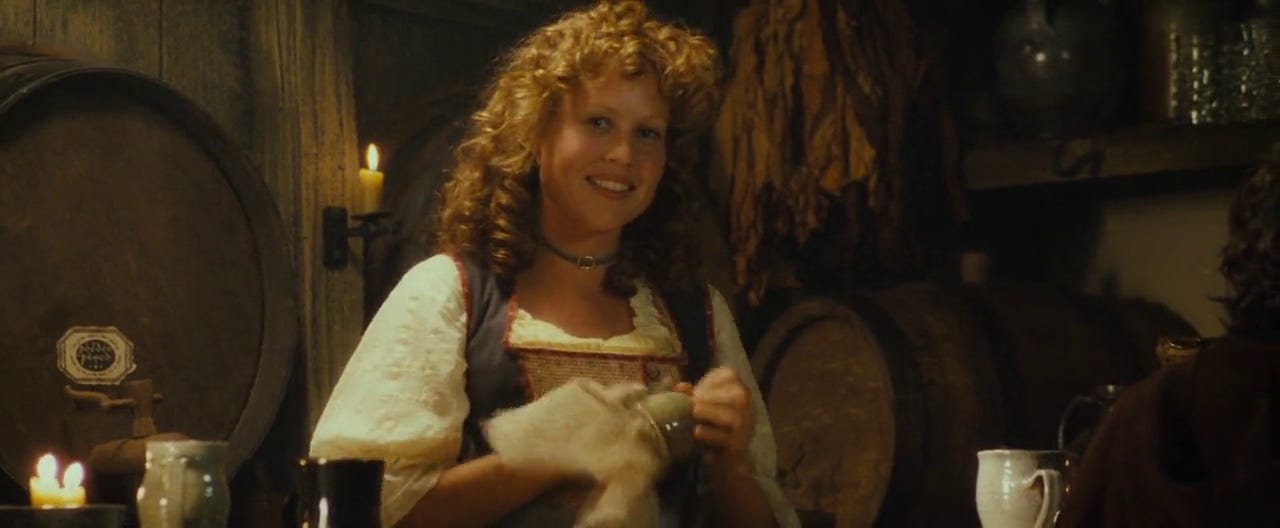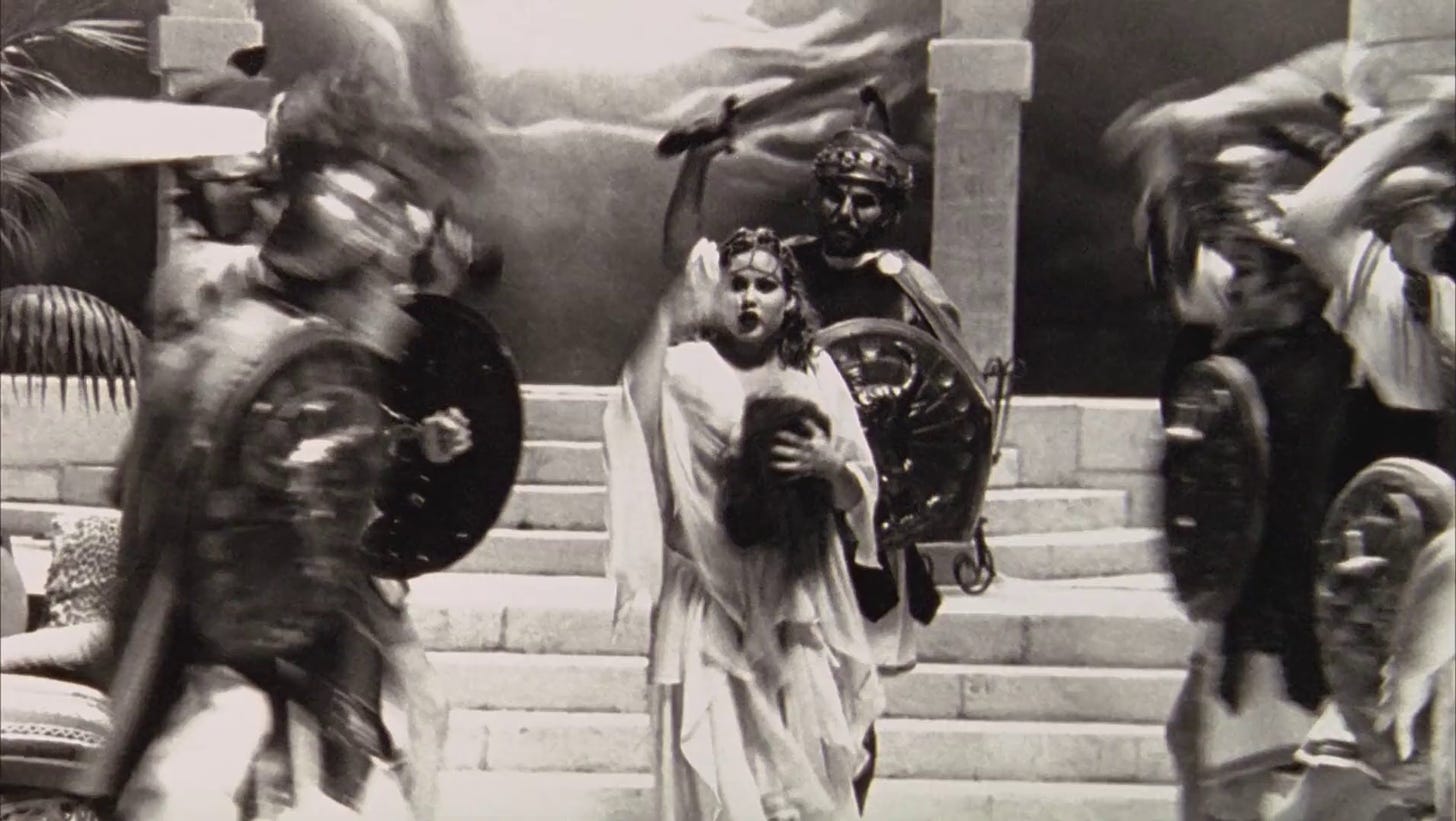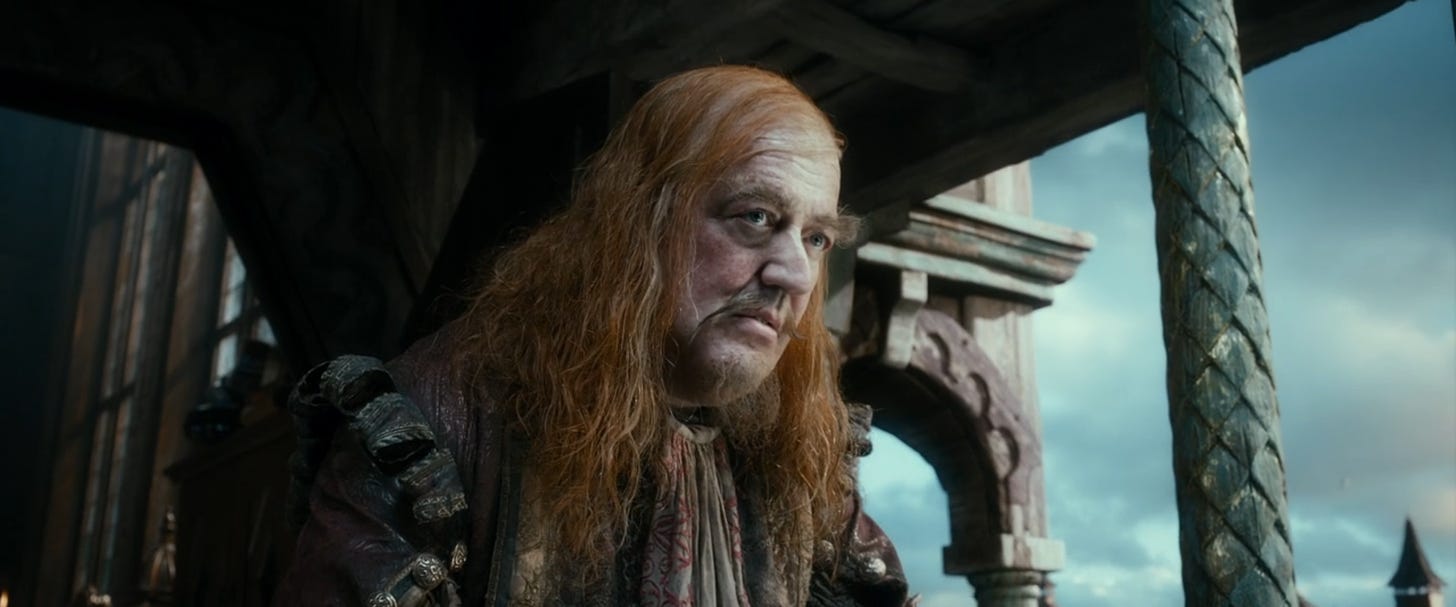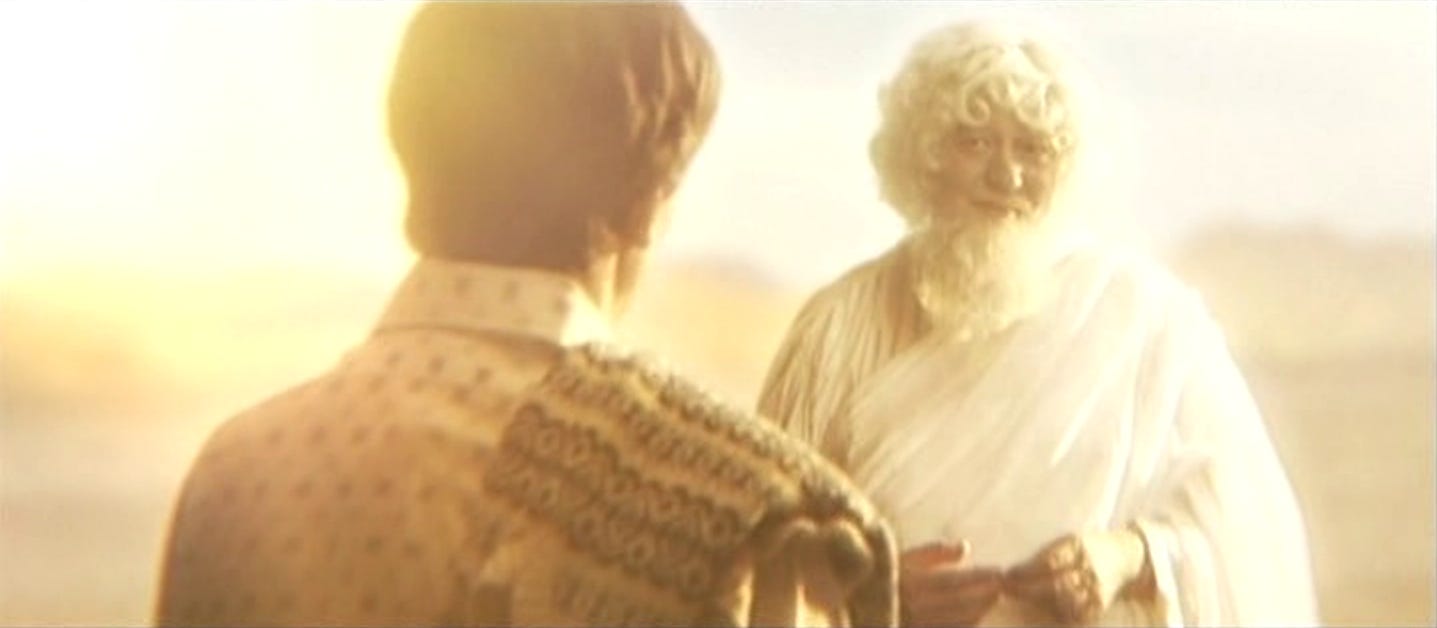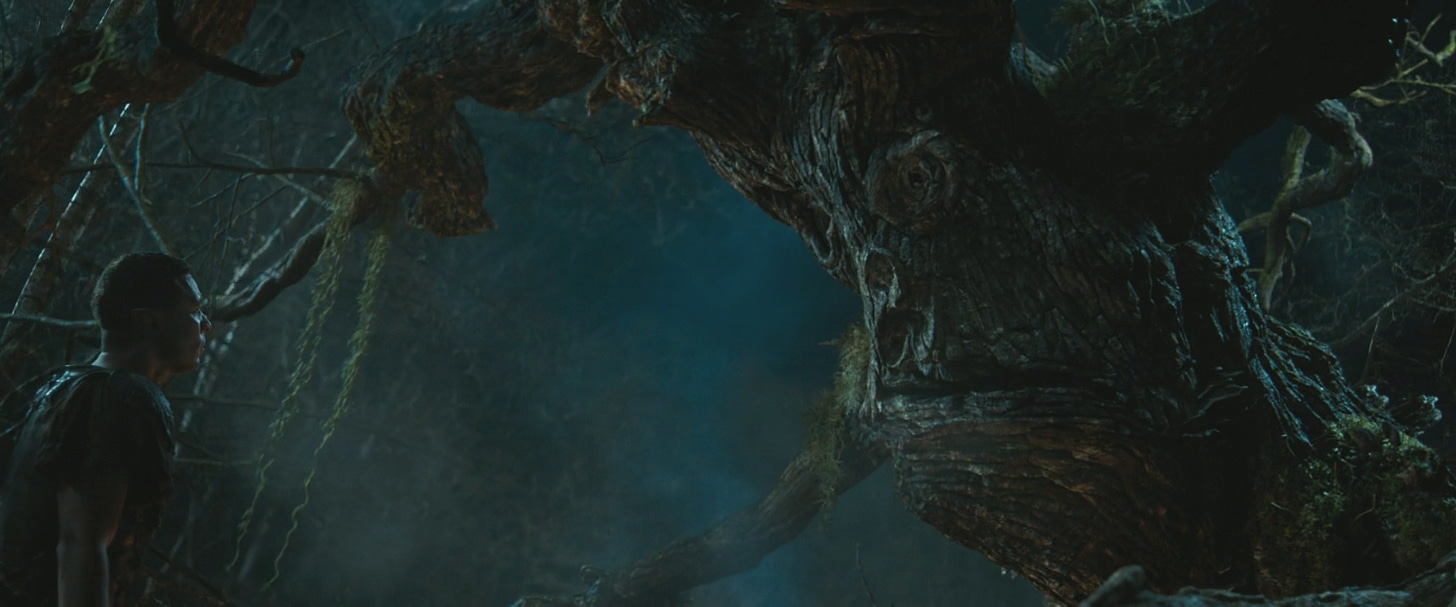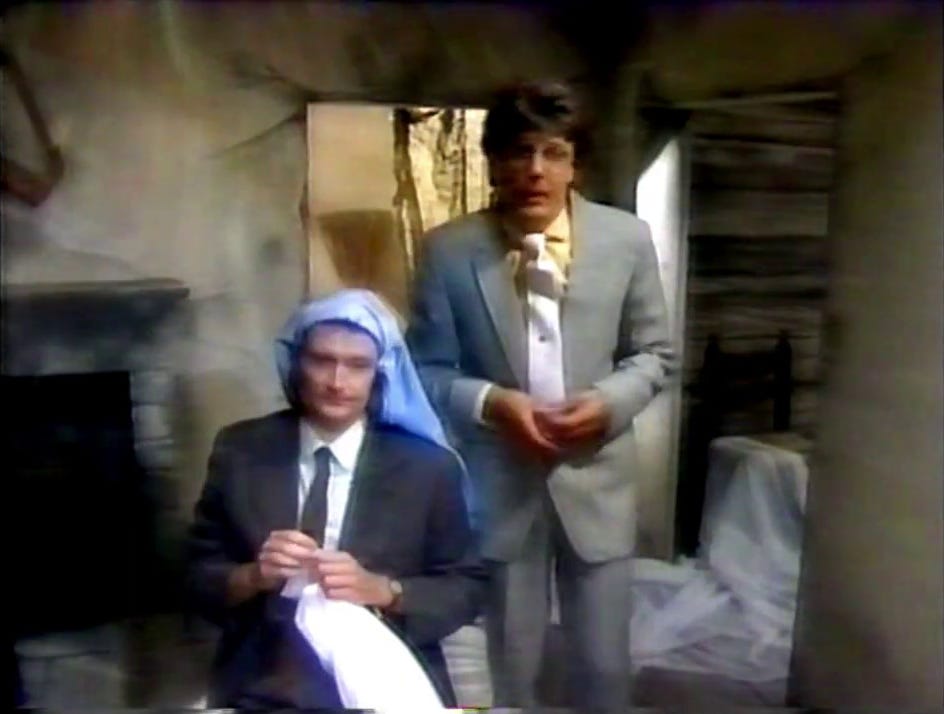How many Hobbit and Lord of the Rings actors have also been in Bible movies?
The list is long, and includes such names as John Huston, John Hurt, Ian Holm, Sean Bean, John Rhys-Davies, Christopher Lee, Ciarán Hinds, Benedict Cumberbatch... and kind of, sort of, Peter Jackson.

There has never been more new Middle-Earth “content” than there is right now.
The Lord of the Rings: The Rings of Power wrapped its second season on Amazon Prime a few weeks ago, and the anime film The War of the Rohirrim is coming to theatres in December, making this the first time ever that new Middle-Earth stories have appeared on the big screen and the small screen in the same year.
On top of that, Warner Brothers announced in May that they’re developing a live-action film called The Hunt for Gollum—which will basically flesh out a subplot from The Fellowship of the Ring—and at least one more new movie is in the works, too.
So this seemed like a good time to give the film and TV adaptations of J.R.R. Tolkien’s novels the Bible-movie-overlap treatment, where I go through the cast list for an entire franchise, I find all the actors who have also appeared in Bible films, and I post a collection of screencaps showing the actors in all their relevant roles. (Series I’ve covered in the past include Star Wars, Harry Potter, Indiana Jones, and Dune.)
I’ve been thinking of tackling the Hobbit and Lord of the Rings movies for a while, partly because there are some obvious points of contact between these films and the Bible-movie genre. Tolkien was a devout Catholic whose religious sensibility is reflected throughout his work, and the Middle-Earth movies often play like historical epics that happen to be deeply informed by the supernatural, not unlike certain Bible movies.
But there are more direct connections between these films and the Bible-movie genre, too—like the fact that Peter Jackson, who has directed or produced every big-screen Tolkien adaptation of the past quarter-century, also co-directed Forgotten Silver (1995), a mockumentary about a filmmaker who makes a Bible movie. (Two of the actors in the movie-within-the-movie also appear in Jackson’s Lord of the Rings trilogy.)
In addition, John Huston, who voiced Gandalf in a couple of animated TV-movies, previously directed The Bible: In the Beginning… (1966) and played Noah (and the voice of God!) in that film. So that’s another Middle-Earth veteran who not only acted in biblical or Bible-adjacent movies but actually directed one of them.
As with the Dune adaptations, it might be a bit of a misnomer to refer to the Middle-Earth films and shows as a single “franchise”. Like Dune, there have been at least three major iterations of Middle-Earth in film and TV over the past half-century, each of which takes place in its own narrative/corporate universe. In this case:
First there were the animated films (1977-1980).1 There were three, produced by different companies with different voice casts and very different aesthetics—two were made for television and one was made for the big screen—but they all covered different parts of Middle-Earth lore, and they all came out in the correct narrative order, so they function collectively as a sort of de facto trilogy.
Then there were the Peter Jackson films (2001-present). Jackson himself directed all six films in the Lord of the Rings and Hobbit trilogies, and he and his writing partners are currently writing and/or producing The War of the Rohirrim and The Hunt for Gollum, both of which will feature actors from his trilogies.
And now there is the Prime Video series (2022-present). The Rings of Power takes place thousands of years before Jackson’s films and has no direct ties to them, but it is clearly influenced by them and even has some of the same creative personnel (e.g. concept artist John Howe, main title theme composer Howard Shore).
That last point may mark a significant difference between the Middle-Earth movies and the Dune movies. Sequels aside, the Dune movies and miniseries have very little in common aesthetically, whereas the Middle-Earth films all feel like they’re part of a shared cinematic tradition that goes beyond the texts they’re adapting.
At any rate, all three of Middle-Earth’s cinematic phases are represented in the list of actors below, as is nearly every film within those phases.
A few other quick points, before we get to the gallery:
As before, I limited my search to the credited actors, and I did not investigate any of the actors who were listed at the IMDb as “uncredited”.
Many of these actors appeared in multiple Tolkien films, but I am listing them just once, in connection with their first appearance in the franchise.
The “Bible films” featured here are films and TV shows that adapt biblical narratives. This includes fictitious stories that take place in the ancient world and have some sort of connection to the biblical narrative, like Ben-Hur, as well as films and shows that put biblical stories in quasi-modern settings, like Kings or The Margate Exodus or the upcoming book-of-Acts series Testament.
Films about angels and demons (e.g. The Prophecy), films that allegorize biblical situations (e.g. Gospel According to Harry), films that are essentially set in the present day but feature biblical relics or flashbacks to biblical stories (e.g. The Da Vinci Code), and films about people who produce films and plays that are based on the Bible (e.g. Forgotten Silver) all go in the ‘Honourable Mentions’ list.
The Tolkien actor with the most Bible-movie experience is Stuart Scudamore, who had a bit part as a ‘Grizzled Southlander’ in The Rings of Power and has seven Bible movies under his belt. John Rhys-Davies, who played Gimli in the Lord of the Rings movie trilogy, has six such movies under his belt.
The Bible movie with the most Tolkien actors is The Passion (2008), a BBC-HBO miniseries that has four such actors. The aforementioned Forgotten Silver (1995), which is a movie about a Bible movie, also has four such actors.
One extra note: The War of the Rohirrim hasn’t come out yet, so it’s a little early to say who all the voice actors in that movie will be. (We do know that at least one of them is a Bible-movie veteran, and he is accounted for below.)
There are also, in theory at least, going to be three more seasons of The Rings of Power, plus, as noted above, we may see The Hunt for Gollum in a few years.
So I may update this list as future films and episodes come out.
And now, to the gallery itself!
The movies
The Hobbit (1977)
John Huston (Gandalf) played Noah, the voice of God, and the Narrator in The Bible: In the Beginning… (1966), which he also directed.
Hans Conried (Thorin Oakenshield) voiced the Innkeeper in Christmas Is (1970) and played Nebuchadnezzar in Greatest Heroes of the Bible (1979).
Richard Boone (Smaug) played Pontius Pilate in The Robe (1953).
John Stephenson (Bard; he also voiced Dori and the Great Goblin in this film, as well as a Gondorian Guard, Dwimmerlaik, and the Witch-King of Angmar in the animated version of The Return of the King) played John the Baptist in Day of Triumph (1953).
Thurl Ravenscroft (Bolg; he also voiced a Goblin and an Orc) voiced Shem, Ham, and Japheth in Noah’s Ark (1959) and the Potter in The Small One (1978).
Don Messick (Balin; he also voiced Gwaihir, Tom, Grinnah, and some Goblins and Orcs in this film, as well as Theoden, Easterling, and the Mouth of Sauron in the animated version of The Return of the King) voiced Joseph (and Waldo) in Christmas Is (1970) and a Roman Soldier in Nestor, the Long-Eared Donkey (1977).
Paul Frees (Bombur; he also voiced the troll Bill Huggins in this film, as well as Elrond, Captain Shagrat, Lieutenant Snaga, and some Orcs, Goblins, and Uruk-Hai in the animated version of The Return of the King) voiced Noah and God in Noah’s Ark (1959) and Aaron’s Father (and the Magi) in The Little Drummer Boy (1968).
The Lord of the Rings (1978)
Christopher Guard (Frodo) voiced Jonathan in Testament: The Bible in Animation (1996).
John Hurt (Aragorn) played Jesus in History of the World, Part I (1981); he also played Professor Harold Oxley in Indiana Jones and the Kingdom of the Crystal Skull (2008), an adventure film in which the Ark of the Covenant has a brief cameo.
Peter Woodthorpe (Gollum) played Nabal in The Bible Collection: David (1997).
Philip Stone (Theoden) played Jethro in The Bible Collection: Moses (1995); he also played the Dad in A Clockwork Orange (1971), which has a sequence in which a character fantasizes about living in biblical times.
Andre Morell (Elrond) played Sextus in Ben-Hur (1959); he also played Pontius Pilate in Caesar’s Friend (1947) and Abraham in The Little Dry Thorn (1947), neither of which I have been able to see.
Alan Tilvern (Innkeeper) played Paul’s Father in A.D. Anno Domini (1985).
John Westbrook (Treebeard) played Cornelius in Paul of Tarsus (1960), which I have not been able to see aside from a few clips.
Fraser Kerr (Saruman) voiced one or more unidentified characters in The Story of the Other Wise Man (1989).
The Return of the King (1980)
Roddy McDowall (Samwise Gamgee) played Matthew in The Greatest Story Ever Told (1965); he also played Saint Peter in Unlikely Angel (1996).
The Lord of the Rings: The Fellowship of the Ring (2001)
Ian Holm (Bilbo Baggins) played Zerah in Jesus of Nazareth (1977) and voiced Pontius Pilate in The Miracle Maker (1999).
Sean Astin (Samwise Gamgee) played Stuart in Amazing Love (2012), a movie about a youth pastor who tells some teenagers the (dramatized) story of Hosea.
Sean Bean (Boromir) played Esau in The Bible Collection: Jacob (1994) and Severus in The Young Messiah (2016).
John Rhys-Davies (Gimli; he also voiced Treebeard in the other two parts of this trilogy) played Nestor in The Nativity (1978), Silas in Peter and Paul (1981), Mordecai in One Night with the King (2006), Caiaphas in Saul: The Journey to Damascus (2014), Annas in Killing Jesus (2015), and Peter in Peter: The Redemption (2016); he also played Sallah in Raiders of the Lost Ark (1981) and Indiana Jones and the Last Crusade (1989), both of which are adventure films about biblical relics being rediscovered in the 1930s.
Christopher Lee (Saruman) played Rameses II in The Bible Collection: Moses (1995) and Rameses I in In the Beginning (2000).
Marton Csokas (Celeborn) played Lamech in Noah (2014).
The Lord of the Rings: The Two Towers (2002)
John Noble (Denethor in the extended edition) played Prince Admatha in One Night with the King (2006).
Bernard Hill (Theoden) played Pharoah (sic) Mann in Exodus (2007), a modernization of the Moses story that is also known as The Margate Exodus; he also played Susan’s Father in The Loss of Sexual Innocence (1999), which has flashbacks to Adam and Eve.
Bruce Hopkins (Gamling) voiced various unidentified characters in the animated The Ten Commandments (2007).
The Lord of the Rings: The Return of the King (2003)
This film did not, apparently, introduce any new actors with Bible-movie credits (but see the movies-about-people-who-make-Bible-movies section below).
The Hobbit: An Unexpected Journey (2012)
Ken Stott (Balin) voiced Simon Peter in The Miracle Maker (1999).
James Nesbitt (Bofur) played Pontius Pilate in The Passion (2008).
Aidan Turner (Kili) is reportedly playing Andrew in The Way of the Wind, which is still in post-production.
Benedict Cumberbatch (the voice of the Necromancer; he also played Smaug in the other two parts of this trilogy) played Benjamin in The Book of Clarence (2023); he also voiced Satan in Good Omens (2019), a series about angels and demons set in the present day that has some flashbacks to the events of the Bible.
Conan Stevens (Bolg; he also played the Keeper of the Dungeons in The Battle of the Five Armies) played Goliath in The Bible (2013).
Kiran Shah (Goblin Scribe) played Jude in The Passion (2008); he also played Abu in Raiders of the Lost Ark (1981), an adventure film about the Ark of the Covenant.
The Hobbit: The Desolation of Smaug (2013)
Antony Sher (Thrain in the extended edition) voiced Asher Ben Azra in The Miracle Maker (1999).
The Hobbit: The Battle of the Five Armies (2014)
This film did not, apparently, introduce any new actors with Bible-movie credits.
The Lord of the Rings: The War of the Rohirrim (2024)
Brian Cox (Helm Hammerhand) played King Vesper Abaddon in Kings (2009), a series that sets the story of Saul and David in an alternate version of the present day, and he narrated the King James Version of The Lumo Project: The Gospel of John (2014); he also voiced Death in Good Omens (2019), a series about angels and demons set in the present day that has some flashbacks to the events of the Bible.
The TV show
The Lord of the Rings: The Rings of Power (2022-present)
Nazanin Boniadi (Bronwyn) played Esther in Ben-Hur (2016).
Joseph Mawle (Adar in Season 1) played Jesus in The Passion (2008); he is also reportedly playing Saul in The Way of the Wind, which is still in post-production.
Rory Kinnear (Tom Bombadil) played Andrew in Judas (2004); he also played Father Dillane in The Second Coming (2003), a miniseries about the apocalypse.
Ciarán Hinds (Dark Wizard) voiced Lucifer in Testament: The Bible in Animation (1996) and played Herod in The Nativity Story (2006) and the Father in Last Days in the Desert (2015).
Ben Daniels (Círdan) played Jonathan in The Bible Collection: David (1997), Caiaphas in The Passion (2008), and Pontius Pilate in Jesus Christ Superstar Live in Concert (2018).
Zates Atour (Brânk) played Jacob in Ben-Hur (2016).
Stuart Scudamore (Grizzled Southlander) played Judah in In the Beginning (2000), James in Bible Mysteries (2004), Street Preacher in The Nativity Story (2006), Ramesses in The Bible (2013), King Hamor in The Red Tent (2014), Peter in Risen (2016), and Gamaliel in Testament, a modernization of the book of Acts that is currently in post-production.
Zubin Varla (additional voices) played Shepherd #2 in The Bible Collection: Jacob (1994).
Honourable mentions
Lord of the Rings actors who have played allegorical Bible characters
Viggo Mortensen (Aragorn in the Lord of the Rings trilogy) played a man named Wes in Gospel According to Harry (1994), an arthouse movie about civilizational malaise that is divided into chapters with biblical titles; at one point, Wes puts a sponge on a golf club and holds it up to a man who has been crucified. Mortensen also played Lucifer in The Prophecy (1995), a present-day horror movie about a war between the angels.
Lord of the Rings actors who have been in movies about Bible movies
Peter Jackson (director of the Lord of the Rings and Hobbit trilogies; he had cameos in all six films, too) played himself in Forgotten Silver (1995), a mockumentary he co-directed about a silent-era filmmaker who makes a movie about Salome.
Thomas Robins (Déagol in the live-action version of The Return of the King; he also played Young Thrain in An Unexpected Journey) played Colin McKenzie, the filmmaker who also plays John the Baptist in the Salome movie, in Forgotten Silver (1995).
Sarah McLeod (Rosie Cotton in The Fellowship of the Ring and the live-action version of The Return of the King) played May Belle, the actress who plays Salome, in Forgotten Silver (1995).
Jeffrey Thomas (Thror in An Unexpected Journey and The Desolation of Smaug) narrated Forgotten Silver (1995).
Stephen Fry (Master of Laketown in The Desolation of Smaug and The Battle of the Five Armies) played God in Holy Flying Circus (2011), a comedy about the controversy over Monty Python’s Life of Brian, a parody of the Bible-movie genre.
Charles Edwards (Celebrimbor in The Rings of Power) played Michael Palin in Holy Flying Circus (2011).
Simon Greenall (Miner #1 in The Rings of Power) played Barry Atkins (and the Pub Landlord) in Holy Flying Circus (2011).
Jim Broadbent (the voice of Snaggleroot in The Rings of Power) played Wallace, an actor who plays Mary, a Magus, and various other characters in a two-man interpretation of The Messiah (1984); he also played Dean Charles Stanforth in Indiana Jones and the Kingdom of the Crystal Skull (2008), an adventure film in which the Ark of the Covenant has a brief cameo.
Lord of the Rings actors who have appeared in Bible-adjacent films
Several actors with Hobbit or Lord of the Rings experience have appeared in films and TV shows that feature biblical characters or have some sort of tenuous connection to the Bible but are not adaptations of biblical stories, per se.
Whistle Down the Wind (1962) is a British film about children who somehow come to believe that a fugitive hiding in a barn is actually Jesus Christ.
Norman Bird (Bilbo Baggins in the animated version of The Lord of the Rings) played Eddie.
A Clockwork Orange (1971) is a dystopian film about a violent young man; at one point, he fantasizes about doing violent things in biblical times.
As noted above, Philip Stone (Theoden in the animated version of The Lord of the Rings) played the Dad.
Raiders of the Lost Ark (1981) is an adventure film about the Ark of the Covenant, a biblical relic that behaves in this film much as it does in the Bible.
As noted above, John Rhys-Davies (Gimli in the Lord of the Rings trilogy) played Sallah.
As noted above, Kiran Shah (Goblin Scribe in An Unexpected Journey) played Abu.
Indiana Jones and the Last Crusade (1989) is an adventure film about the Holy Grail, a biblical relic that goes back to the Last Supper.
As noted above, John Rhys-Davies (Gimli in the Lord of the Rings trilogy) played Sallah.
The Prophecy (1995) is a horror film, set in the present, about a civil war between the angels.
As noted above, Viggo Mortensen (Aragorn in the Lord of the Rings trilogy) played Lucifer.
Unlikely Angel (1996) is a Christmas comedy about a singer who dies and goes to Heaven but gets a chance to return to life on Earth.
As noted above, Roddy McDowall (Samwise Gamgee in the animated version of The Return of the King) played Saint Peter.
The Loss of Sexual Innocence (1999) is a British film set in the present day that has occasional flashbacks to the story of Adam and Eve.
As noted above, Bernard Hill (Theoden in The Two Towers and the live-action version of The Return of the King) played Susan’s Father.
The Second Coming (2003) is a two-part miniseries about a man who learns that he is the Son of God and has to find some way to prevent the apocalypse.
As noted above, Rory Kinnear (Tom Bombadil in The Rings of Power) played Father Dillane.
The Da Vinci Code (2006) is about a conspiracy to hide the “fact” that Jesus had a child with Mary Magdalene; it has a few flashbacks to the biblical era.
Ian McKellen (Gandalf in the Hobbit and Lord of the Rings trilogies) played Sir Leigh Teabing.
Indiana Jones and the Kingdom of the Crystal Skull (2008) is a sequel to Raiders of the Lost Ark in which the Ark of the Covenant has a brief cameo.
Cate Blanchett (Galadriel in the Hobbit and Lord of the Rings trilogies) played Irina Spalko.
As noted above, John Hurt (Aragorn in the animated version of The Lord of the Rings) played Professor Harold Oxley.
As noted above, Jim Broadbent (the voice of Snaggleroot in The Rings of Power) played Dean Charles Stanforth.
The Dovekeepers (2015) is a miniseries about the fall of Masada, which isn’t exactly biblical but does take place in first-century Judea.
Sam Hazeldine (Adar in Season 2 of The Rings of Power) played Flavius.
Britannia (2017-2021) takes place during the Roman occupation of Britain in the AD 40s; in Season 2, it introduced a subplot tied to the death of Jesus.
Trystan Gravelle (Pharazôn in The Rings of Power) played Derog.
His Dark Materials (2019-2022) is partly about a war between rival angel factions across different universes; one angel used to be the biblical figure Enoch.
Morfydd Clark (Galadriel in The Rings of Power) played Sister Clara.
Will Keen (Lord Belzagar in The Rings of Power) played Father MacPhail.
Good Omens (2019-2023) is a series about an angel and a demon that takes place in the present day but includes a few flashbacks to the biblical era, too.
As noted above, Benedict Cumberbatch (the voices of Smaug and the Necromancer in the Hobbit trilogy) voiced Satan.
As noted above, Brian Cox (Helm Hammerhand in The War of the Rohirrim) voiced Death.
Simon Merrells (Watchwarden Revion in The Rings of Power) played Lesley, the International Express Man.
And, I think that about covers it. Did I miss any actors? If so, please let me know!
-
Past Bible-movie/franchise overlap galleries:
Star Wars | Harry Potter | Downton Abbey | Indiana Jones | The Exorcist | Labyrinth + Willow | Dune | The Omen | Alien
In the past, I have generally ignored the animated parts of the franchises I’ve covered, for three reasons (at least two of which don’t apply to the Middle-Earth movies):
First, the animated spin-offs within a franchise tend to be rather ephemeral—but the animated Hobbit and Lord of the Rings adaptations are anything but. They played a big part in the imagination of young Tolkien fans at a time when live-action versions of those stories were basically impossible to make or see, and Peter Jackson has acknowledged paying homage to those films in his own movies. So they are very much part of the Middle-Earth cinematic tradition, and their effect on that tradition continues to be felt.
Second, the amount of animated content I’d have to wade through for one of these projects can be overwhelming at times (e.g. the hundreds of animated Star Wars episodes produced since the mid-1980s)—but there are only three animated Middle-Earth films so far, which is much more manageable. (The War of the Rohirrim will be the fourth.)
And third, part of the fun of making these galleries is seeing the actors in different makeup and costumes at different stages of their lives, and you don’t really get that when they contribute nothing to the characters besides their voices—but the animated Middle-Earth films do feature major live-action actors (and Bible-movie veterans) like John Huston and John Hurt, and it would be a shame to leave them out of a list like this altogether.
So this gallery includes the animated Middle-Earth films, even though a few of their voice actors were animation regulars whose only contribution to the Bible-movie genre consists of other animated films (Christmas cartoons, mainly, plus a Noah film).



